#there's this one dialogue with iori and mai and she was like
Text
BIG 101 PENTAGON THEORY // SPOILERS FOR CANTO VI, DEMIAN (book), LITTLE PRINCE (book), LEVIATHAN, LIBRARY OF RUINA, a little bit of Divine Comedy too
RG - Red Gaze, PT - Purple Tear, LP - Little Prince, DC - Divine Comedy. Grammar mistakes can appear due to me not being very fluent in English.

So… After the new Demian scene appeared, I found it convenient to finally unleash my Dante=Sinclair pentagon theory, based on some assumptions I made from reading the source books of all of these characters. Before I start, I need to aknowledge some other things:
1. I don’t find this theory as something that actually will happen, since it may be based on my own biased opinions towards some of the characters included
2. Most of my assumptions are made through reading into intertext of the source books and how it would look more cool to potentially appear in a game. PM interpretation of books may be completely opposite from mine, so ig we will see how close I was later
3. I don’t use other sinners for my theory, since most of them are not marked, can’t use shin from what we know and/or mostly have finished self-centered story. The only one that probably will be added to pentagon is Faust, since her source is too important for Hesse as a writer and the motif of soul duality exists as an important topic in both Demian and Faust books. Also she knows too much about the Stars from what we can see in the prologue and later in her dialogues with us.
Part 1. Purple Tear
PT=Demian’s mother feels like canon already for me, but maybe just because I discussed it too much with my friends. So the main point of this theory is that Demian and PT appear to have the same main themes as characters and have similar powers, so him being Iori’s son will be natural. For example, the snake theme being introduced to us with Iori’s snake eyes in Leviathan manga or with the blue snake representing Demian on LCB Sinclair art. Multidimensional traveling powers, Shin being mostly PT’s disciples thing etc etc. Also Demian had purple eyes on his first promotional art and even though it was changed later, it is still an important thing that was planned by PM. For me it's an obvious moment for a lot of reasons, but in reality they just feel like relatives and the more you think about it the more it becomes obvious.
As Demian’s mother, she becomes frau Eva naturally and potential Sinclair milfhunter’s interest.
Also I believe in Iori as a higher-up person in Limbus Company assumption. As a person, who sees countless possibilities, her choices on sinners of LCB feels natural and the fact that Vergilius out of all people becomes our guide just approves it to me.
So I added ‘Demian’ to her as a source just to start, but we can also add ‘Little Prince’ as I believe that she also represents the snake from the start of Prince’s adventure on Earth and his end on it. The Snake claims to have some sort of space-traveling power after all and while representing Birth and Death of Prince on Earth, she's a good pick for a mother figure representation.
Part 2. Red Gaze
Not too much to say here, but the obvious things we know. The Shin user triangle, even though Verg and Demian probably ain’t ever met each other once, still exists in the context of this theory. We can or can not draw a line between Demian and Vergilius, but I like to do it for the sake of making a point how they both are PT’s disciples.
The christmas trauma line here is mostly for funsies, but it’s obviously not a coincidence on how the whole Sinclair’s family killing incident happened at the same time as Vegilius’ orphanage incident and how both suspicious shin users just watched them suffer to mentor them later.
Dante and RG are connected through Divine Comedy, which is told directly from the game.
Part 3. Demian
The most interesting and most intertextually written character in the game.
Sinclair being the rose became more believable to me than him being the fox after a new scene, but I still think both can be true. As we know from Demian book - Sinclair is final destination of Demian’s journey, from whom Max parted for unknown reasons (basically not answered his letters while doing his own fun stuff ig) and even tried to adapt to live in the world ignoring his marked nature (the “I am actually a lieutenant” scene in the 7th chapter). He is meeting Sinclair at first to part with him later just to end up becoming a metaphorical part of him at the end, probably dying physically. The same happens with Prince and Rose relationships in the LP. From them meeting suddenly to part later because of Prince’s complicated feelings to Prince finally coming back to her after learning how to love her and realizing her importance for his existence as a person in the metaphysical form, leaving his physical body behind. The story is too similar for Sinclair to not be Rose. The main counterargument here is the fact that we don’t know when Demian started his journey and Sinclair quoting dialogue of LP with fox. I still believe that Sinclair-Rose theory is more likely though, but Sinclair-Fox is still leading us to doomed yaoi in the end.
The Demian-Beatrice part comes from ‘Demian’ as a source too. Sinclair met Beatrice as his muse and basically Demian’s replacement as an image of his own ideals in life, she became a reason for him to stop his self-destruction path. Young love for Sinclair here is more of a reason to keep moving forward to become a better person than actual loving feeling. She is a mythological muse, but not a romantic interest fully. And in an attempt of engraving her image (haha engraving aspect), he accidentally draws Demian instead. We can put it as a direct equation of her to Demian and as a method of inserting an androgynous archetype into Demian’s character. I think of Demian-Beatrice as a cool way to introduce us to Paradiso later with him being our new guide instead of Vergilius. It will become a more logical guess later, in the context of the main part of this theory.
Part 4. Dante and Sinclair
So… Dante is a book version of Sinclair with part of Demian’s soul inside him theory… The main thing from where we should start to think about this is the whole number dilemma within Sinclair’s coat. He should’ve been the 10th Sinner before Dante appeared, but then got changed to 11th. Which is funny since 1.0 and 1.1 is a funny version number calambour. So, questions that theories answers:
1.Demian having sudden interest in Dante and giving him riddles that mostly answers the nature of more of a Demian himself as a person, than giving Dante actual usable information
2.Dante seem to have mark
3.”What will become of me who have been robbed by me”
4.Sinclair is the only sinner we resonated with out of his Canto
5.Sinclair Canto only focusing on the first two chapters of the book, but not taking it as full. His Canto takes not even half of a book, but focuses on a really small part of it. Moby-Dick is a pre-story in Canto V, same basically for Canto I and Canto IV, we are close to the ending of CaP in Canto II and we have seen the true ending of WH in one of the Mirror Worlds with Cathy and Hareton.
6. Why they aren't changing numbers on Sinclair's coat for six Canto already
7. How Demian is able to understand us and how we are able to deeply understand Demian's feelings
8. Why we have any connections to Demian in the past and why we owe him a drawing of all things (Sinclair was a painter in the book)
9. Star is the main motivation of Dante
10. The whole engraving aspect thing. Again, Sinclair was a painter in the book and used drawing as a way to analyze his instinctive feelings
11. Dante having religious motifs and powers associated with either Tree of Life or Tree of Knowledge. Sinclair’s EGO “Branch of Knowledge” naming based on that
12. Dante’s White Night motifs. White Night is basically an Antichrist, but also a God, which connects it with the concept of both god and demon and connecting it with an Abraxas
Maybe some other questions are answered too if you think about it for a little. This is just a very solid assumption that will explain why Demian is so important for us and why Dante seems like a descendant of the Star in the prologue. As a character having another big source book I also believe in him having his own Canto and if he is a part of Dante's character then we should have the duo Canto for both Dante and Demian.
Main thing is how it happened. It's mainly fanfiction from now on. We know that there are Mirror Worlds where the whole book plot is already happened at some point (Cathy and Hareton scene in C6). So one of these basically is the one where Sinclair journey happened some other way. Maybe it was the one, where Demian helped him before the whole Kromer situation happened. After that moment in book Sinclair fastly falls back to his family and stops questioning their beliefs, so in my theory he could after all have a prosthetic operation that he was destined to before incident. That way we have his life going more calmly and as a son of prosthetic factory owner he could become a big and rich person. That would explain why Panther, Lion and Wolf were very excited over killing him. So, Sinclair of this universe goes over his way just like book Sinclair and participate in the whole June-985 thing. What else happened in June? World War 1 start. Sounds stupid, but WW1 is the main thing to change the world in Demian as a book. So the start of new world is destined to be in June-985 in the City setting, which represents WW1 starting in the Real World. The whole thing happens, and Demian either dies or merges with Sinclair to become some sort of part of him. To prevent the whole June-985 thing from happening, Sinclair travels back in time (which basically not the same, but another Mirror World) using Golden Bough and tries to engrave something that is a key to preventing the whole mass death thing. Limbus World Demian is pissy with Demian from future trying to stop the new World from happening, so he confronts us, but tries to do it in his own way. That way Dante is Sinclair from future from other mirror world and is partly a Demian himself.
In the LP, Pilot also is a child-like adult, really similar to Little Prince in some way. I personally like to read his journey with Prince as a metaphor for himself maturing and letting go his childish side, which Is again connects Dante to Demian.
So, Dante=other Sinclair=Pilot=partly Demian.
#limbus company#limbus theory#sinclair lcb#demian lcb#lcb#dante lcb#vergilius lcb#iori lor#library of ruina
14 notes
·
View notes
Photo
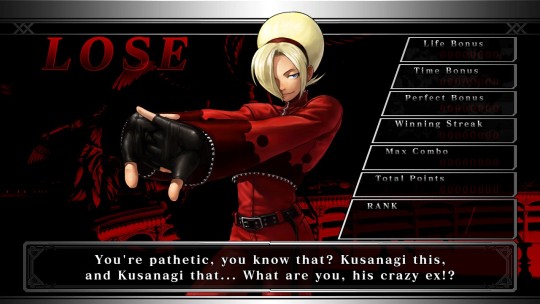
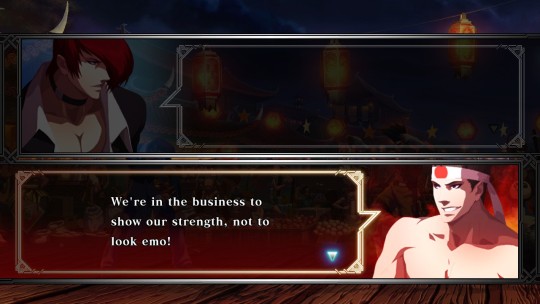
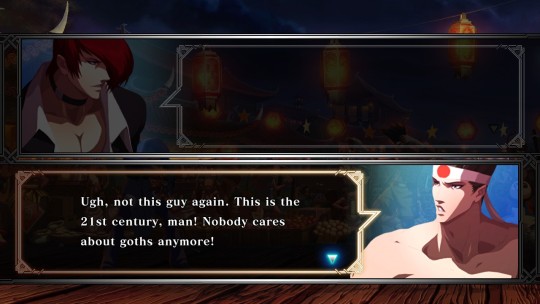
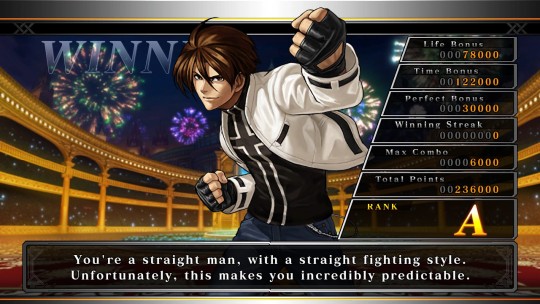
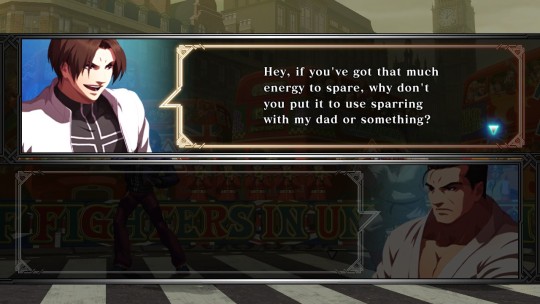

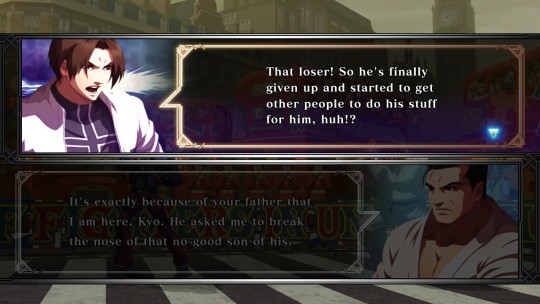

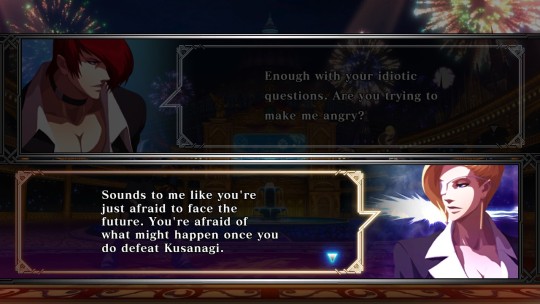

kof 13 screenshots 👍
#what are you his crazy ex!? jddskndkjsnfjsdnksjdnfjkn oh ash i wonder that too as well#kyo is soooooooo funny [poking him with a stick]#there's this one dialogue with iori and mai and she was like#are you even a dude? you don't think i'm pretty :( and like. mai. gay people exist#kof 13 dialogue like i said is my favorite ones ever also the win qoutes#just noticed the win screen is so funny bc the winner at the back is blocked by the character depending on the portrait#and it will just look like winn jkdnjdskngsjk#omg i should've took a screenshot of the one with nests kyo vs k' where kyo is like sorry i can't help i got a beautiful face fjskdnjsngkj#he does a have a beautiful. face. i guess. hmph.#anyway kof 13 is awesome :) i like playing it teehee#sometimes i just don't play it in weeks then booom spend hours on it doing whatever#i need to practice my terry or get a permanent third for my main team#i'm good with playing nests kyo and ex iori the third i pick changes all the time u_u....#i have iori on point and kyo on anchor just need an awesome mid..... hmmm#i was thinking king maybe... i did go through arcade mode with that team setup and yeah pretty ok#used to play king and it's still so awesome <3 i do miss having double strike as a special and not a super tho... but it's alright ig orz#there is air venom strike :)
23 notes
·
View notes
Note
💛?
Hi! I assign you...
Athena Asamiya!
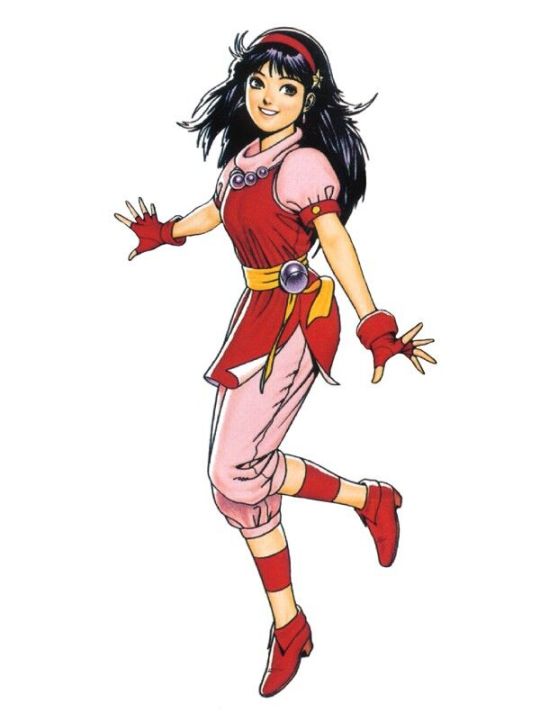
she is like. THE magical girl in kof. let me tell u all abt her. so she has psychic powers!! and shes an idol! but shes like very chill and literally THE nicest character in the series. she loves her peter rabbit tea set which like. best character trait etc! shes rly good at like making web sites and enjoys all kinds of computer stuff! she loves sweet foods (Momiji manju, things with kinako dissolved in milk; strawberry daifuku, Sakura daifuku, churros)!! when i tell u genuinely. she is nice to LITERALLY everyone. let me like give examples: iori and ash. iori is like. evil supreme but not really. hes goofy silly hes my babygirl but everyone hates him. but athena shows like. genuine concern for him esp after all hes been thru (iori is like um. sure involved in plots). ash is literally the worst 16 year old ever (affectionate. hes like a brother to me) and EVERYONE but maybe 4 people hate him. now let me like show u some of her win dialogue to ash in particular:
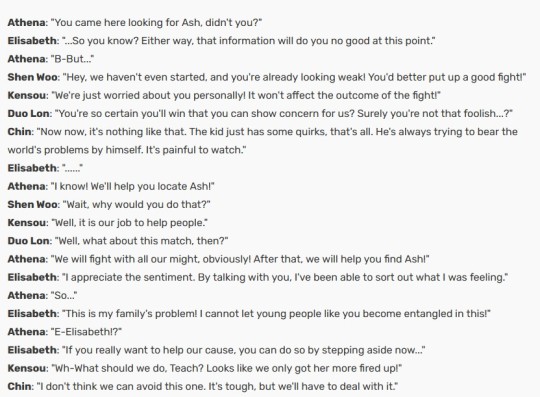
^ GOING INSANE. so ash went missing and like. shes never been on his team. she has NO reason to rly wanna help him or his team. but by god she is gonna. i just ough.

^ ALSO THIS. like ash genuinely is very much a guy who like carries stuff on his own and doesnt like to confide in other people when he has problems and even tho theyre fighting shes like trying to help him.
OK. back to info i just like. needed u to see how shes just genuinely SUCH a kind person. OK ALSO. u will like this but shes like. def aromantic coded a bit

^ kensou is her teammate and she is like. always rly friendly to him despite him just being like hey kinda interested in u romantically she just like. blows him off on it completely. and is just like so glad we r friends :)
SHES ALSO LIKE. very strong to fight as! shes not my main or anything but shes rly rly tough!! BUT ANYWAYS. blorbo image time.
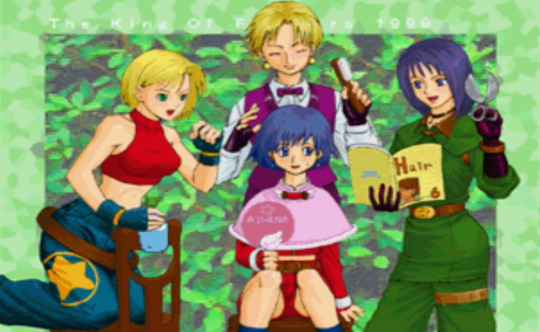
^ this pic is like. actually so swagtacular. so let me give like an explanation. athenas hair length changes in EVERY game and her hair was a short bob in 99 (when this art is from!) but the fact that like idk. it feels like a very trans picture to me personally (i hc her as nonbinary if that matters lmao) but how like blue mary (far left in the red top) is just like cheering her on, and how king (middle in the pink suit) is like just rly cheerfully giving her a haircut and how even leona (far right in the green suit) is having a good time. images that mean the world to me etc. also like. shes friends w the womens team canonically (which has Mai, King, and Yuri a lot of the time) and i just ough. idk i love their interactions.

^ this picture is simply like rly pretty n cool and i just. ough. she is so strong she is my best friend etc. i love her so much and this art is so good.

^ rough sketch but like. i need u to see shes besties w my friend Kula. i love it so so much i just oughhhh sobs. i love how theyre friends. i just oughhh <- is experiencing many emotions rn

^ her w her team!! the old guy (Chin Gentsai) is her and Kensou's mentor! and kensou is the guy to the far right! i just ough. they r all friends etc. i love it

^ my fave athena look! its from kof 2001 and i just ough. i love her outfit here and her short hair! imo it rly suits her and i just!!! i love athena so much literally one of THE characters ever
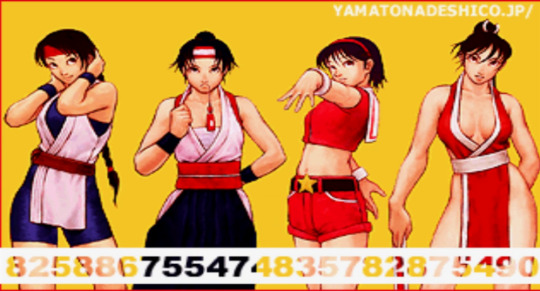
^ NEED u to see her cute little red shorts outfit here! the other characters from L to R are: Yuri Sakazaki (my best friend!! shes another character i think u would like), Kasumi Todoh (VERY swag she makes funny puns), Athena, and Mai Shiranui (literally THE woman EVER AND EVER.)
#asks#kof posting#i go INSANE over her dialogue like........ guhhh#shes so so good and like idk i think shes kinda twish adjacent <3 in the way i love her a lot and like understand her rly well etc
7 notes
·
View notes
Text
“The 02 characters didn’t get any character development”
Yes, they did.
“But -- “
Yes, they did.
Having had the gift of having rewatched 02 recently, I have to say that it still really, really confuses me how the hell people get this impression. It’s not even “I’m trying to see the best out of this” but that I genuinely do not get it, because as far as I’m able to see it’s pretty much literally right there!! This isn’t even tinfoil hat tier!
But in case you have any doubts, sit down because Shiha’s gonna sit here and write a meta about the 02 kids, and how they are perfectly reasonable characters that developed properly fine over the course of the series.
(All below translations of 02 dialogue are by PositronCannon.)
So the first thing to understand about 02 is that it is fundamentally made with a very different writing approach from Adventure in the first place, and therefore it is not meant to be compared in a one-to-one fashion.
This is a point I’ve said many times over and over, and I think it’s to the point where it shouldn’t even really need official clarification, but I’m just going to go ahead and bring up the words from Director Kakudou himself:
For instance, we had the prior series stick out in terms of its points about “what it means to be oneself”, and for 02 we made it so that you would pay attention to “the relationship between yourself and other people”.
Right, so: 02, by design, does not use Adventure’s character development methodology of “self-awareness”. It is built from the ground up by having its characters and character development predicated on relationships instead of singular characters. This might seem a bit odd on its face, but no man is an island, and, in fact, changing the way you interact with other people and with the world in general does speak a lot about one’s personal growth in its own way. And this also means that if you try to analyze 02 by holding it to Adventure-based standards of “character focus episodes” or the like, you’re already on a losing battle.
This means that character growth in 02 is not presented in a way where it’s up-front and center, but rather something you have to glean over the natural course of the series. We’re working off relationships, so you have to actually pay attention to the natural interactions between the characters or what they say even during “off-hours” -- the focus-episode format used by Adventure doesn’t apply here anymore. And it’s something apparent enough from how “evolution” is a metaphor for “personal growth” in this franchise -- in Adventure it was via the Crests, which meant self-awareness, but 02′s key evolutionary trump card is Jogress, which relies on the strength of relationships.
One thing I have to say in terms of my experience as a 02 fan is that I’ve found I actually appreciated it significantly more as an adult than I did as a kid, and that, in general, a lot of the things to appreciate about 02 are things that you really viscerally feel and understand when you’ve gotten that degree of life experience under your belt. Unfortunately, this is kind of a double-edged sword, too, because it ends up becoming the kind of series that often risks going over the heads of the very audience of children it was supposed to be targeting. It’s got a lot of very nuanced depictions of mental health and the childhood experience that are maddeningly subtle, to the point of possibly going over one’s head or even coming off as illogical without sufficient life experience, or simply just not being as visceral (the entire theme of “parents stroking their own ego with their kids’ achievements” hits the hardest when you’re college age).
So what this means is that 02 doesn’t exactly hand its themes or character development to you on a plate. But it is there, once you actually start looking for it.
Let’s start off by talking about our main core cast of characters. Adventure and 02 prided themselves on the fact that they tried very hard to not be adherent to anime tropes, but rather to portray well-rounded, nuanced characters that felt more like actual kids you might meet at school. So how does the 02 cast fare in not being pigeonholed anime tropes?
Daisuke: Even though official freely admits he has “the most anime-like personality”, it’s hard to say he actually falls that much into the generic shounen archetype. For one, he’s actually shockingly humble and polite in certain situations (he’s consistently polite with his elders, and is very quick to admit his own limitations). Actually, he comes off as a surprisingly friendly and deferential person -- it’s just that he happens to have somewhat of an abrasive exterior, and even then it’s implied heavily in the first half that this stems from a lack of validation and purpose. (He actually “deflates” really easily, so you can’t even say he’s all that arrogant past the surface.) Certainly he’s simple-minded, and kind of an idiot, but his abrasive exterior is actually pretty deceptive.
Miyako: Miyako floats an interesting duality of simultaneously being aggressively feminine and being aggressively un-feminine -- not necessarily in the sense she tries not to be feminine (on the contrary, she absolutely embraces it), but more that she’s also an aggressive, “inelegant” mess in ways atypical for a lead heroine in a shounen show, who are usually either cute or “badass action girls” and not...a mess. Despite that, she is also consistently portrayed as capable of heavy emotional depth and being very genuinely kind and concerned about others, which are not in any way diminished by the fact she happens to be an aggressive mess with a severe case of foot-in-mouth syndrome. It’s an interesting mix of character traits that you don’t see often.
Iori: “Designated young characters” usually fall into the “cute” archetype a la Adventure!Takeru or Tomoki, so it’s interesting that the youngest one is actually the most mature one, and impeccably polite at that (having been raised by a family that emphasizes formal manners and propriety). Even more interestingly, nobody actually treats him like he’s that much younger, and he’s given the weight of respect in a sense that has nothing to do with his age (think about how there are indeed quite a few kids who simply just get along better with older kids). Yet the series doesn’t shy away from his youth, and his overly black-and-white view of morality is portrayed as immaturity in its own way, along with the occasional “slips” in his facade or manners indicating that it’s still something he has to consciously focus on.
Ken: Ken’s development goes without saying (it’s one of the most consistently praised aspects of 02), but it’s also interesting to note the unusual way the series plays his redemption arc. Instead of making him a typical “jerkass anti-hero who learns to get a bit better”, the series completely blindsides you by revealing that Ken is, in fact, a naturally soft-hearted and kind boy, and then plays up the mystery of the severe kinds of trauma that would lead him down that path. And ultimately, even though the cause is revealed to have supernatural influence, the series also makes it clear that it doesn’t matter -- that, whether it was his conscious “fault” or not, he still is responsible for what he did. And on top of that, it also scorns the usual “redemption by sacrifice” mentality by pointing out that it’s a cop-out -- it doesn’t actually solve the problems that were caused, and, in fact, a much better way to make up for things is to fix them going forward.
Takeru: Takeru had the “designated young character” role in Adventure, and it turns out that once one of those gets a few years older, they’re naturally not going to be nearly as pure and innocent! The “sweet child” from Adventure has now grown into having slightly pettier emotions, even to the point of grudge, and things he won’t let go of. Oh, and also, trauma from three years prior is still going to have impact on an eleven-year-old kid. Who would have thought.
Hikari: Adventure’s most infamously inscrutable character also seems to have gained some individualized, not-quite-innocent traits of her own (observe how she deals with Daisuke’s advances), and, moreover, it turns out that her deferential humility and refusal to open up about her problems is...not a good thing! when it starts to actually bite her in the rear in front of her friends. Yeah, it turns out that being the “quiet cute girl” actually has its own mental health drawbacks. Oops.
We’re doing pretty well, actually! At the very least, they certainly feel like they already have the Adventure/02 brand of character nuance, where their personalities are inherently varied and nuanced enough that you may not quite find characters like them elsewhere. On top of that, we definitely get to see what makes these characters “tick” -- we get a lot of depth into their thought processes and what their likes and dislikes or strengths and weaknesses are, and that’s something 02 still completely beats out a lot of other kids’ shows or even certain other Digimon entries with.
But here we’re talking about character development. So what do we know about them at the very beginning of the series?
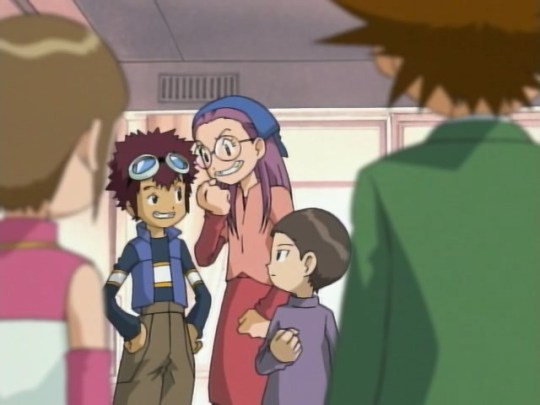
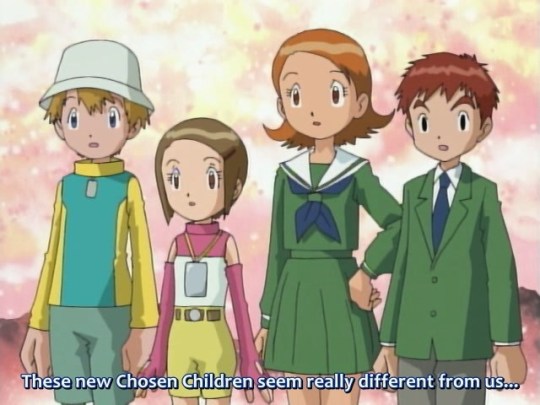
Having watched 02 in Japanese a few times and being very used to the core cast’s latter-half characterizations, rewatching the early episodes always strikes me really hard in the face with genuine shock at how shallow the kids -- especially Daisuke and Miyako -- start the series off as. It’s understandable in terms of the context of the series -- unlike the Adventure kids, who were thrown into a “survival, need to get home” situation off the bat and thus already understood the need to be wary, these kids started off having comparatively easy access to home at any time, and didn’t have a constant sense of danger and survival looming over their heads. It naturally took a lot of time for the gravity of the situation they were in to start really hitting them, and so even the relatively straight-laced Iori didn’t exactly take it all that seriously at the beginning.
Yet while it took them a significantly more delayed time to understand what they were dealing with and take it as seriously as they needed to...they started cultivating something else in the meantime.
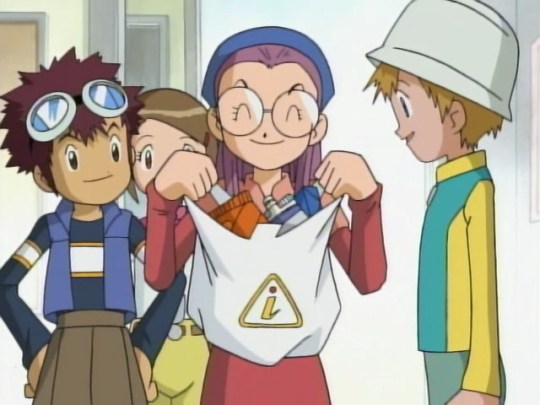
02′s first half is especially full of “random banter conversations” that seemingly involve nothing in particular, but, in fact, that’s actually part of the point. One thing I have always been quick to point out in regards to 02 is that it is rather unique among Digimon series in how it goes out of its way to portray its core cast as having become friends even in pure daily-life social friend terms, even if it had absolutely nothing to do with Digimon incidents -- these are kids who genuinely enjoy each other’s company even in the most mundane of situations. This was something that wasn’t the case for the original Adventure kids -- having been a group of kids thrown together by necessity, even though they most certainly kept in touch and trusted each other as fellow Chosen Children deeply, they started floating back into their own different social clusters after the events of 1999. Relationships are multifaceted, after all; you can still have a deep relationship and bond without necessarily being friends on a social level.
But already, off the bat, Miyako brings food for her new best friends, and it’s implied that she’s the main ringleader behind holding the picnic -- a picnic that started off having no intended relation to the Digital World territory war -- in episode 6. And, to be quite honest, can you really blame these kids? Even the Adventure kids wistfully entertained the idea of a long-term fun adventure through the Digital World in Adventure episode 54, wanting to enjoy its beauty and fun in a situation where they weren’t constantly running for their lives. Now that this luxury is actually available, why not take advantage of it -- and bond further with the others in the process? And for the rest of the year, these kids actively end up spending mundane conversations together and bonding to the point that, by the time we get to the end of 02, these kids have just genuinely bonded so much that they really come off as a cohesive, inseparable unit that would actively choose to spend time with each other if given the opportunity. In fact, even going through all of the TV Digimon series that exist as of this writing, I would say Appmon is the only one that really competes with 02 in portraying its core cast in this manner.
Again, remember: this is a series where characterization is dependent on how the kids treat others and interact with them, so you do actually have to pay close attention to these interactions and see how they change over the course of the series.
So once the episodes start coming in play, we actually learn a lot more about what happens when the characters start breaking away from their shallowness. For instance, episode 8, one of the first key episodes to understanding Daisuke’s character:
Daisuke: He'll be a great opponent. We didn't face off in the last tournament.
Takeru: If you had made it to the finals, you would have, right?
Daisuke: Don't remind me...
Hikari: Can you win?
Daisuke: It's not about winning or losing. Right now, all of the boys who play soccer in this country want to be like him. Just thinking about playing against him makes me excited!
For all Daisuke initially seems to be arrogant, he’s actually not that incapable of humility. Far from it, actually; he does have a genuine love for soccer and the spirit of the game, and, when completely and obviously unmatched, fully admits he has no chance and is set on enjoying the most he can out of it anyway. I feel like Daisuke’s surface-abrasive attitude really does throw off the fact that he’s a lot more genuinely humble than he’s given credit for. In the end, he’s satisfied enough with the accomplishment of pulling off one sliding tackle against Ken, and is able to enjoy that -- a foreshadowing of how the latter half relies so much on the fact that he’s capable of enjoying simple pleasures and being straightforward about them.

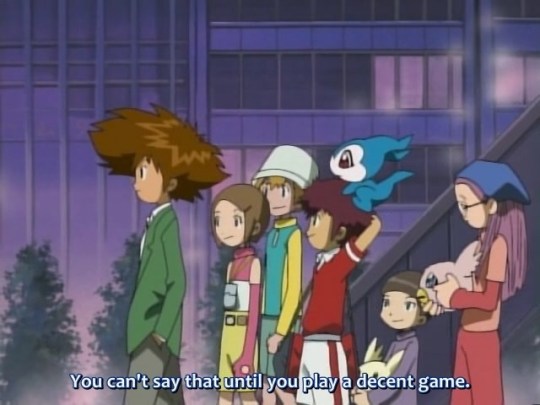
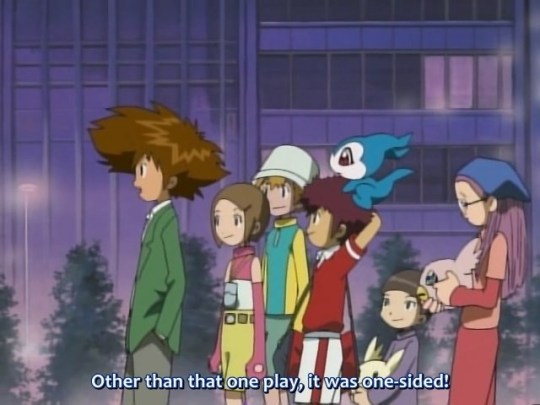
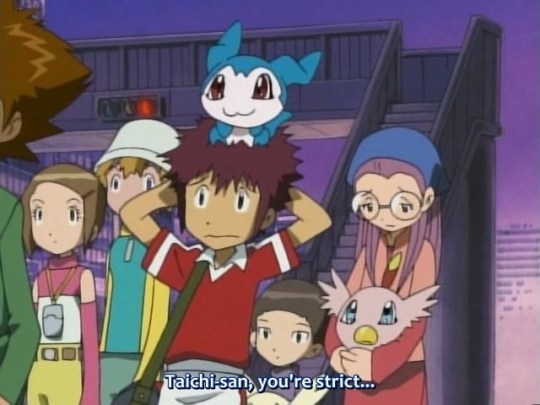
I find that this scene is really underappreciated, too (mainly because it gets lost in all of the other major things in this episode) -- while Daisuke jokes about his accomplishment, it only takes a single comment from his respected senior Taichi to shut him down.
There’s a huge reason I constantly emphasize that Daisuke respects his elders -- this part tends to get lost in translation a lot (especially the American English dub, which just smashed this aspect out of him wholesale, among other things) due to it being a bit reliant on Asian senior deference and cultural propriety, but Daisuke is respectful not only out of societal obligation but also because he genuinely respects his elders! The way he looks up to Taichi and chases after his approval is genuine, and even his interactions with the other Adventure kids have a major hint of him having genuine respect and deference to them. Daisuke is just a deferential person in general -- note that while his crush on Hikari tends to manifest when he’s at his most shallow, he’s actually the one putting Hikari on a pedestal (considering it his own responsibility to impress her), so he’s not actually as assertive as he tries to come off as. The first half of 02 arguably has him deflating more often than he actually stands his ground...and this is a trait of him that starts to actually change quite a bit over the course of the series.
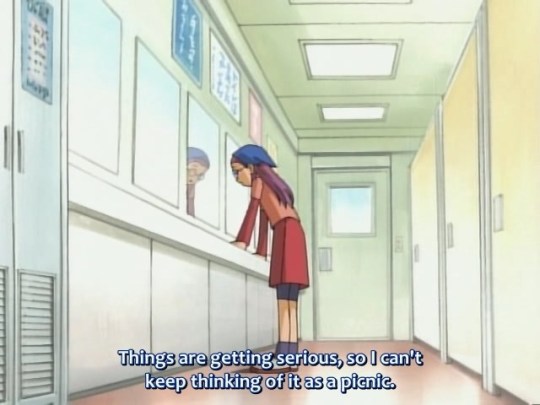
Miyako comes to terms with the fact that maybe she’d been taking this whole Digital World adventure thing too lightly in episode 10, indicating that she actually does have a good sense of priorities when they become increasingly clear! This is actually very important, because it fleshes her out as someone who’s emotionally sensitive -- too emotionally sensitive, to the point that “emotional sensitivity” is just as much of a driving point behind her later breakdown in episode 18, this time from taking her duties too seriously. Miyako is a very id-driven person, and so a lot of the early series is her struggling to find a proper balance on how to adjust her emotions in an increasingly escalating situation. Her heart is in the right place, she’s just not someone with an inherent sense of preparedness to deal with this kind of problem.
We get into the secondary Digimental arc, and there’s a noticeable consistent thread that all of them involve admission of personal faults. This is something that tends to throw people off at times -- wait, having bad traits about yourself is what awards you? -- but the point is that this isn’t like Adventure’s Crests, where things came from proof of exercising the virtue, but rather admitting that there are ways you need to improve, and showing a will to improve in that manner. In the end, people are not perfect human beings, and sometimes even understanding that you’re deficient is half the battle -- after all, the second half is all about a certain character named Ichijouji Ken coming to terms with some very, very serious personal problems.
In episode 11, Daisuke completely admits that he doesn’t feel he understands the concept of friendship the way Taichi and Yamato et al. see it, also latently admitting that he doesn’t see himself as worthy of the Digimental of Friendship. Beyond betraying a lot deeper issues within Daisuke that he seems to have actually had a background lacking in friends and sources of validation, he actually acts very self-effacing when admitting his issues to Taichi and Yamato, ultimately culminating in him calling himself pathetic. Or, in other words, he does want to be a better friend and to understand the concept better, and is harsh on himself for not doing better (which, of course, ultimately leads to how he eventually does gain better relations with the rest of the group and reaches out to Ken).
In episode 14, Miyako admits that she’s shallow and judgmental and tends to jump to conclusions based on first impressions. Recall that she’s comparing herself to Mimi in said relevant scene -- Mimi, whom she admires, and actually spends part of the episode trying to understand and empathize with the mentality of. This is not a statement of Miyako being proud of herself. Rather, this is Miyako being very straightforward about the fact that she needs to try harder to see through the essence of things and to see through to the emotional core of. Again, something she actually does start developing over the course of the series.
In episode 16, Iori gets his first major lesson on the limitations of being too stuck on principles in his attempt to be honest. Recall that Iori’s later character arc is very dependent on him realizing that his own view of the world is too black-and-white. It’s great if you could never tell a lie to anyone, ever, but in the end, that’s going to reach limitations of practicality -- after all, as Jou points out, what Iori did ended up not actually hurting Jou in comparison to the incredible amount of hurt it would have caused everyone by being too stubborn, and thus Iori would have failed to keep his responsibility to help the others because of one narrow-minded principle.
Hikari even gets in a bit during the infamous episode 13, where we learn that her “passive” attitude is biting her in the rear. In Adventure, Hikari’s passiveness and reticence had mostly been used as satellite development for Taichi (his insecurities as an older brother and his obligations to her), so this is actually the first time we get to see a proper perspective from Hikari’s side, and it turns out that his overprotectiveness has actually caused her to get dependent. But even though Taichi is the one the episode actually focuses on, the larger focus is more specifically on the fact that Hikari is too passive -- that she sees being taken by the Dark Ocean as an inevitable thing that’s just going to happen unless someone else steps in on her behalf. Takeru, of course, is having none of it.
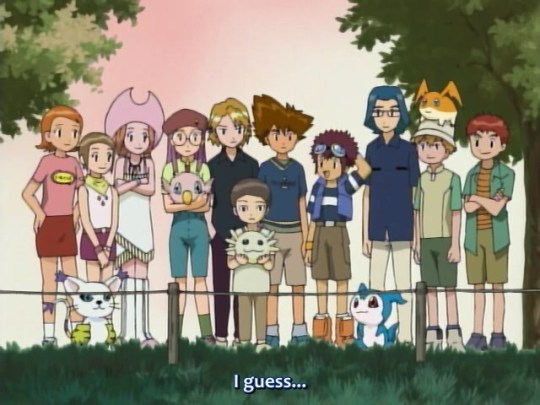
Once that’s out of the way, we go back to taking a look at the subtleties of everyone’s interactions. While everyone generally tends to focus on the second half of episode 17, it’s also pretty interesting to see how the 02 kids react to hearing about their seniors’ adventure in the first half -- remember that this is the first time the 02 kids are actually given any real depth about the degree of 1999′s events that’s not just random points of hearsay, and the way the new kids react to it indicates that they’re thoroughly floored. It’s later established that they didn’t even get the full story (it may not even be possible, given that the Adventure kids’ experiences may well have gone even further beyond what we got to see in 54 episodes), and yet the new kids are overwhelmed. 02 itself does not shy away from the fact that the younger kids really have no qualms about deferring to their seniors if need be, and treating them with utmost respect.
Another minor note, which I pointed out in my Daisuke meta earlier, is that the beginning of this episode is pretty much the last time Daisuke ever shows outright hostility towards Takeru for his relationship with Hikari -- it’s something you have to glean by squinting, but the implication is that the insecure and clingy Daisuke actually got to learn this episode that the two of them had a pre-established shared experience that he himself may not understand, and that it wasn’t just Takeru randomly swooping in and snatching away the closest thing he had to a friend for no good reason.
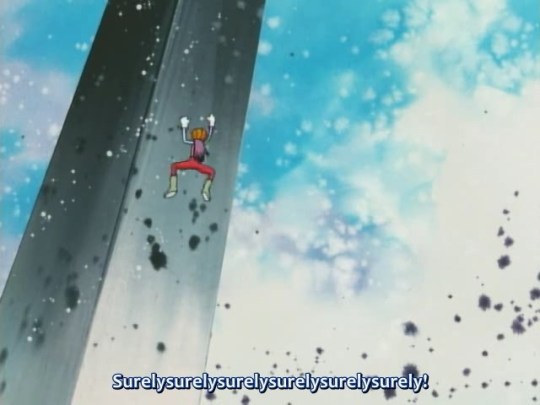
Once the Kaiser infiltration arc begins, episode 18 ends up being one of Miyako’s funniest episodes, but it’s a bit distressing that a lot of people in the fanbase often never let Miyako live this incident down, when in actuality this was explicitly not a good mental health day for her. (This is basically the equivalent of pinning Mimi as a conceited, self-centered jerk based on the fact she was one for a fashion in Adventure episode 25.) The beginning and ending of this episode establish that this is basically a result of Miyako...trying her hardest. She’s scared as hell, but she also learned in episode 10 that this is something she needs to take seriously, and the stress puts her into a mental breakdown. This is why she ends up having a heart-to-heart with Hawkmon at the end; her heart is in the right place, but she needs to find a way to channel her emotional sensitivity in a way that doesn’t make her into a complete mess.
And note that her own voice actress, Natsuki Rio, even pointed out that Hawkmon’s actions had enough of an influence on Miyako’s character that she had to play her differently thereafter.
At first I always played her with Maximum Excitement, and I kept thinking “someone, please, stop her,” but the more straight-laced Hawkmon did his best to pull her in and hold her by the reins (laughs). Thanks to him, Miyako became a lot more of a put-together person…thank goodness Hawkmon is her partner!
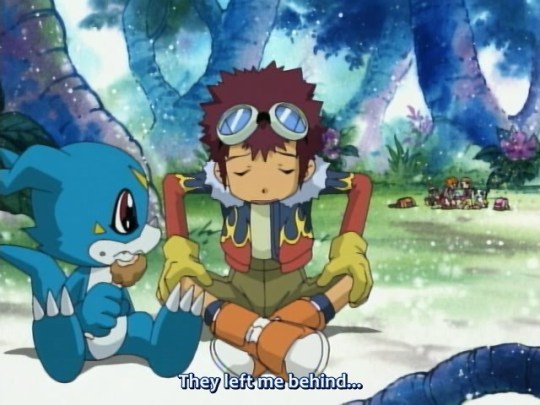
Episode 19 has two interesting things of note that I want to point out -- first of all, starting from the very beginning of the episode, everyone ditches Daisuke because they’re independently going in to infiltrate the Kaiser’s base. Note the complete lack of a plan here whatsoever -- everyone’s just going in on their own -- and the fact that everyone expects Daisuke to come up with what he wants to do on his own. For all it’s worth, even though Daisuke may have a designated protagonist aura to him, within the story itself...nobody actually sees him as a leader at this point in the series (and, to be fair, he’s never really tried to claim the position, either).
It’s similar to how Taichi was never recognized as a particular leader of the Adventure group until Adventure episode 28, but in regards to the full team dynamic, it’s actually inverse -- the Adventure kids were capable of making tactical plans together as early as episode 20, but fell apart emotionally in short order as soon as Taichi was gone, whereas here, the kids are fond enough of each other to hang out socially and support each other emotionally, but they take a while to get any real cohesiveness as a fighting group.
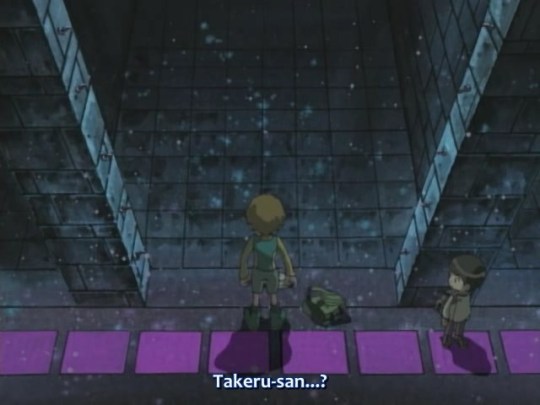
The other is that Iori personally witnesses Takeru’s sudden whiplash into his grudge against the darkness and the Kaiser, and it scares the hell out of him.
Takeru eventually laying a punch on the Kaiser is a pretty awesome moment (and, really, Ken kind of deserved it, so it’s hard to not cheer for him), but it’s also important to note that within the context of the series, this is not a good mental place for Takeru to be in. Iori, the person who should by all means sympathize with hatred of evil things at this point of the series, is still extremely unnerved by Takeru’s actions here, because he’d always seen Takeru as a mature person who’d always kept his composure, only to show a drastically different side of him that he hadn’t even shown a hint of before. That kind of “two-facedness” and emotional repression -- and this way of venting trauma in general -- cannot be good for Takeru at this point in time, and it’s also an important moment for Iori when he later admits during the two’s Jogress arc that he’s having a bit of a hard time understanding him.
And so episode 20 comes, and Chimeramon pretty much takes out the entire party, leading to this conversation.
Takeru: Let's escape.
Daisuke: Escape?
Takeru: We can't fight anymore. Our mission has failed. We'll retreat and wait for another chance.
Hikari: You're right. We have no other choice.
Iori: Understood.
Daisuke: No.
Miyako: Daisuke?
Daisuke: We can't just say "another chance" like that. If we leave now, they'll keep attacking anything in sight. We don't know if we'll be able to get into the fortress again. So this is our only chance!
Hikari: That's crazy...
Iori: Exactly!
Miyako: They're all back to their Baby forms...
Chibimon: Daisuke...
Daisuke: But...didn't you all see it? Destroying those towns...and all we could do was watch quietly. I don't want to see that ever again. I won't let them do whatever they want! So I'm going, even alone. I won't give up now. After getting this far, all I can do is go forward!
Why is this moment important? This is the first time Daisuke has actually stood a firm ground against anyone else in the party -- and not only that, with the entire party standing against him.
Recall that I mentioned earlier that, in spite of Daisuke’s abrasive attitude suggesting otherwise, he actually has a tendency to “deflate” pretty quickly when people tease or criticize him. He spends the first half of the series having a lot more bark than he actually has bite. Earlier in the series, if the entire party were to go against him, he’d be more likely to begrudgingly go along (while complaining) -- in fact, he actually did just that at the beginning of episode 7! But now that push has come to shove, Daisuke’s own sense of morals and bleeding heart have won out. (While his decision here is definitely a bit reckless, he does have a point; if they’d retreated, they might genuinely lose any future chances.) Even with the entire party telling him to pull back, he refuses to accept what they want him to do, and pushes forward.
This is where Daisuke first starts to really make strides towards what becomes his eventual major role in the group as “the one who pulls people forward”. It’s a moment after which the rest of the group themselves also start to treat him with more respect now that he’s proven he’s not just a doormat, and that when it comes to there being a real problem with real priorities, he does have the resolve and initiative to keep going.
Also, a very important point is that he immediately says he’ll go alone if he has to. He doesn’t begrudge the others for wanting to fall back, and has no condescension towards them; he just can’t stand the fact that he himself is being asked to sit it out.
So, you know. Episode 21 happens. Ichijouji Ken goes through some real trauma as Wormmon dies in his arms. And all Daisuke has to say is...
Daisuke: You should go home. There are people who are worried and waiting for you! Go home!
Remember when I pointed out that 02 takes a very unique perspective on Ken’s redemption arc, pointing out the futility of being too trapped in the idea of symbolic penance and focusing more on actively taking steps in the future to make up for and fix things? Here’s our first major sign of this, and Daisuke’s eventual approach to Ken -- Daisuke does not choose to scorn or lambast Ken for what he’s done, even though there are a lot of things Ken deserves to be harped on for, but rather instructs him to take the first active step towards fixing his mistakes, in this case fixing things with his family.
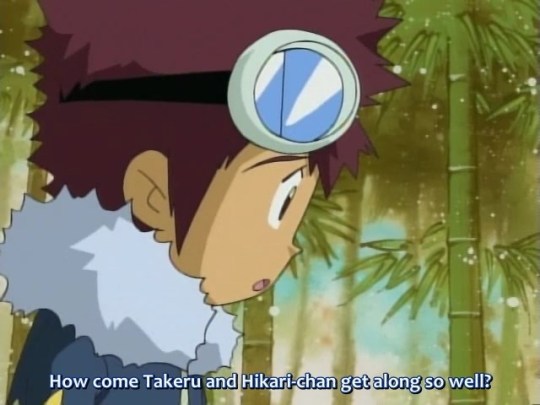
Episode 22 is Daisuke’s own “fanbase will never let him live this down” moment, but there’s still some interesting things to note here. Firstly, Daisuke’s “relapse” happening exactly when it seems like his duty to the Digital World is done and there’s nothing to do besides community service doesn’t seem coincidental, especially when this exact episode actually dedicates a full scene to Takeru, Hikari, and their partners going “...now what?” Secondly, as I touched on earlier, note that Daisuke’s never really seemed to have any resentment against Hikari for not responding to his affections -- in fact, he still considers it his own (and V-mon’s, by extension) duty to be the one to impress her. It’s a surprisingly refreshing take on the “shounen hero with a crush on a girl” trope, because in the end...Daisuke isn’t actually all that possessive of her, he just really wants validation from her, and respects her a lot.
More importantly, though -- note the way Daisuke handles this topic. He’s not actually mad at or resentful of Takeru anymore. In fact, he’s mulling on the topic and wondering what he could do to be on that level. Yup, even when Daisuke’s being shallow and jealous, he’s still learned to handle this issue ever so slightly more maturely than he would have at the beginning of the series.
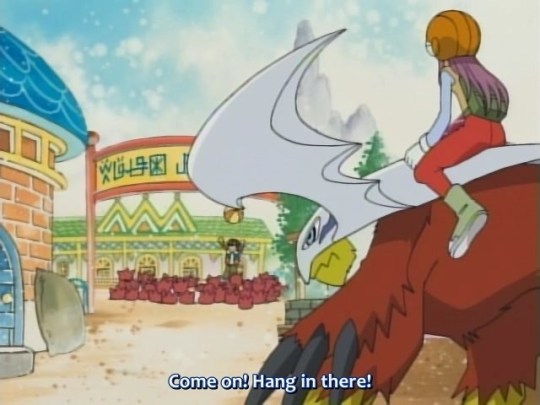
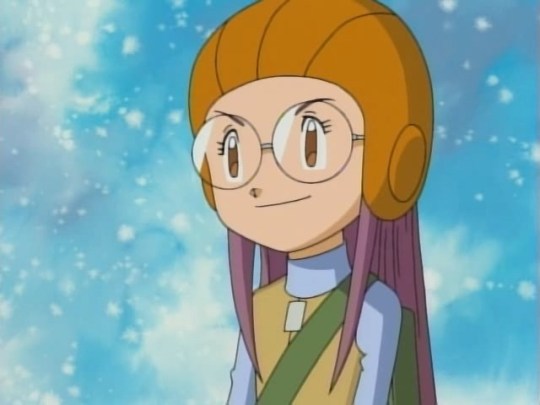
This is also important because only one episode later, once Daisuke becomes disappointed again at Takeru and Hikari walking off on their own, Miyako intervenes -- not only so that Takeru and Hikari can have their space, but also so that Daisuke can have some genuine fun and something to do. This is a very blink-and-you’ll-miss-it moment in episode 24, but it makes it very clear that Miyako was looking out for Daisuke’s welfare, too, and I think it’s very important in light of the events of the prior episode. Miyako, who had always been fumbling on what to do with her emotions, is starting to properly channel them into managing the dynamic between the team and checking in on how everyone’s doing, and that starts to guide her actions and relationships for the rest of the series.
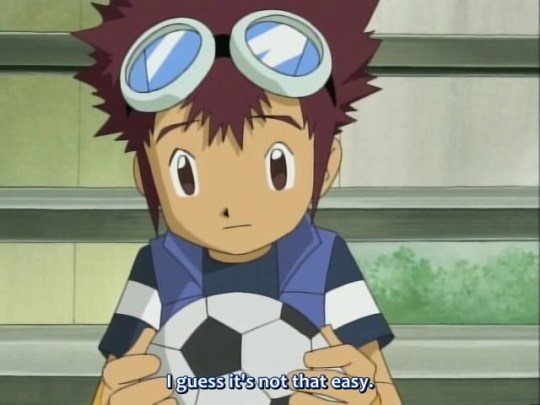
The next episode (25) is where we kick off not only the Jogress arc, but also the arc where we start going into everyone’s attitude towards Ichijouji Ken. This is important not only because Ken happens to be the effective central figure of 02′s story, but also because -- well, remember, 02 is fundamentally founded on the concept of relationships, so it’s only natural that the other kids’ relationship with the “team newcomer” will be a key aspect of the second half, and in relation to their own characters.
Remember how I said that Daisuke’s first-half character involved him being extremely deferential and often deflating whenever he was criticized or someone stood against him? At the time of episode 25, once again, pretty much the entire team is standing against him -- he’s the only one who’s this level of open-minded about getting Ken into the group, and everyone else is showing differing levels of opposition. But while Daisuke doesn’t begrudge the others for thinking this way, he also doesn’t back down, either, and reaches out to Ken on his own because he still really believes in what he’s doing. Now that he’s settled into what it means to be a Chosen Child, he’s started to gain a proper idea of what he wants to do, and what he feels needs to be done.
So, let’s recap everyone’s stances on Ichijouji Ken at the time of this episode!
Daisuke: Forward-thinking and optimistic; willing to believe that Ken should be given the chance to make up for his mistakes and that they should put everything behind him, even to the extent of believing that there’s probably a good reason for the more suspicious aspects about him (prior to the events of episode 25, it was unclear whether Ken was being a bit too callous about killing Digimon). Also the most actively aggressive in reaching out to Ken and trying to get him to join them.
Miyako: Forward-thinking; she openly states at the beginning of the episode that she thinks Ken’s learned his lesson, she’s just worried about whether he’s going to keep doing questionable things in the future (killing Digimon). Once it’s on the table that he’s not just doing this callously, she immediately is on board with him (to the point of even being the first in the group to use given name basis with him), but her stance on what to do with him is more on the edge of “give him space and wait for him to come on his own terms” (she ends the episode saying she’ll be waiting for him to come).
Takeru: States in the episode that he does believe that Ken’s changed, but doesn’t really know what he’s thinking (i.e. too inscrutable to really be sure about). The later episode 35 implies that Takeru was inclined to be a bit more sympathetic than you’d think otherwise, because he understands the trauma of losing a Digimon partner.
Hikari: Wants to wait a little longer and see how things play out. (Remember that Hikari has a known, consistent thread of taking a very passive approach towards things.)
Iori: Absolutely against it on sheer principle.
It should be noted that none of these stances are wrong. Iori sometimes gets a lot of flak for being the one with the most infamously cold stance towards Ken, but when you really think about it, Daisuke and Miyako are very lucky that their hunch about Ken was right and that he actually did happen to be a very kind boy who had a little too much trauma and some supernatural influence. The fact that Ken is a very emotionally withdrawn person for the rest of the series meant that the two of them ended up breaking through to him the most, but there’s nothing wrong with Takeru, Hikari, and Iori’s skepticism; Ken did some pretty shockingly horrible things in front of their eyes for the first half, and it’s entirely within their rights to determine how forgiving they want to be with him.
In any case, we get to episode 26 (the first Jogress), and most of that episode goes without saying, but I do want to emphasize Daisuke’s lines right before it happens.
Daisuke: If you die now, you won't be able to accomplish anything...I don't want that!
Ken: I don't want that...There are still many things I must do.
Daisuke urges Ken not to go for the “suicidal penance” route not only because it sucks, but also because, as symbolic as it may be, it’s also counterproductive to the whole point of doing penance to begin with. If Ken really wants to make up for his mistakes, he’s only going to be able to do that if he’s actually alive to do it! There’s only so much you can do by drowning in self-pity by going “because I did this, because I did that” instead of actually taking responsibility for your actions.
02 itself is deliberately ambiguous on how much Ken’s transformation into the Kaiser was Ken’s own conscious will and how much of it was Dark Seed-induced supernatural influence, but one thing it’s consistent about is that it doesn’t really matter. Regardless of what the cause was, Ken did what he did, and it’s his responsibility to make up for it, and the only way to actually do that is to keep moving forward. The fact that Daisuke is so able to viscerally and directly address what Ken needs the most right now is what fuels their first Jogress, and why Daisuke becomes Ken’s closest friend through the rest of the series.
People have pointed out that 02 has a lot of moments of physical hits, but, notably, other than Takeru punching the Kaiser in episode 19 (which he really deserved, honestly), all of these hits are done with the express intent of bringing the other person out of a very, very deep mental abyss (Yamato punching Taichi in episode 10, Daisuke slapping Ken in 26, Miyako slapping Ken in 30, and Miyako and Hikari’s mutual slaps in 31), because they were in a state where words would no longer reach them otherwise. These are all circumstances of the kind where the person on the receiving end understands that they really needed a drastic wake-up call because of how deeply they’d fallen (and these aren’t some average mental abyss problems these kids are getting put through, either). It’s actually hard to imagine any of the 02 group getting in the kind of genuinely angry and vicious fistfights Taichi and Yamato would in Adventure, because of how close they are (the closest being Daisuke and Takeru grappling in episode 11, but it never got near that level) -- in fact, these kinds of things are done with the implication that they’re doing it because they trust the other person to not hold it against them (and in fact, the fact Yamato does this with Taichi in this way is intended to be read as a sign of how much better they’ve come to understand each other).
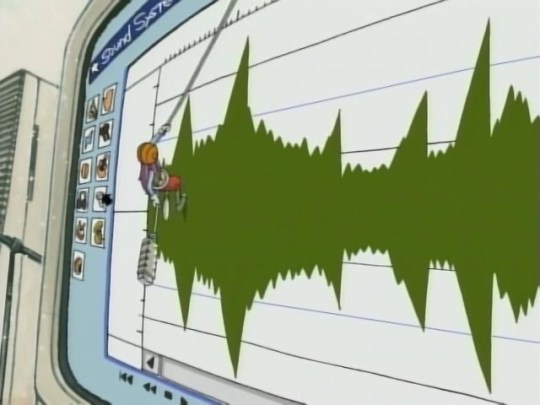
So, moving on with the series! The Giga House incident in episodes 28-29 is the first time the group works together in an organized effort, which is notable not only because it’s their first time coordinating with Ken, but also because it’s their first time properly coordinating at all. Remember when I mentioned that, back in episode 19, as much as the kids were pretty fond of each other and were great friends, they still hadn’t figured out how to actually fight as a team? Here we are, with them actually having started to figure that process out.
We then get to episode 30, where there’s actually quite a lot of interesting things to unpack.
Miyako: What's wrong with you?
Daisuke: E-Eh? Mi-Miyako-san?
Miyako: It feels weird when you add the "-san".
Daisuke: Shut up! Man, you're all the same!
Miyako and Daisuke’s relationship is often misconstrued considering that they’re the two most chaotic in the group (their temperaments are very similar at times, which causes them a lot of friction), but I also think this blink-and-you’ll-miss it moment is pretty much their actual relationship in a nutshell. They fight a lot, and they’re ostensibly vitriolic, but they’re actually two of the most like-minded in the group -- they banter because they’re comfortable with each other. Recall that I mentioned that Daisuke is normally respectful with his elders, yet he’s the only person in the group who won’t use the -san honorific on Miyako (even though she’s the oldest)...but the one time he gets flustered and uses it on her, she tells him that it’s weird and he needs to cut that out. Or, in other words, “it’s not like you to be weirdly respectful of me like that, we shouldn’t have that kind of distance between us, stop it.”
(It’s also pretty notable that Miyako has never seriously used -kun or any other honorific on Daisuke, even right after meeting him -- the only other person she dropped honorifics on was Iori, whom she’d known prior to the start of the series, but she seems to have deemed Daisuke enough of a fellow disaster child that he merited dropping it.)
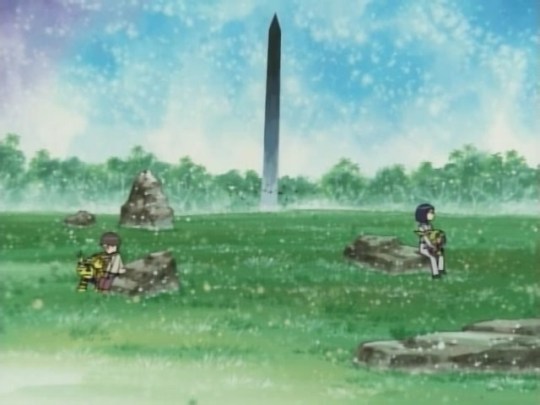
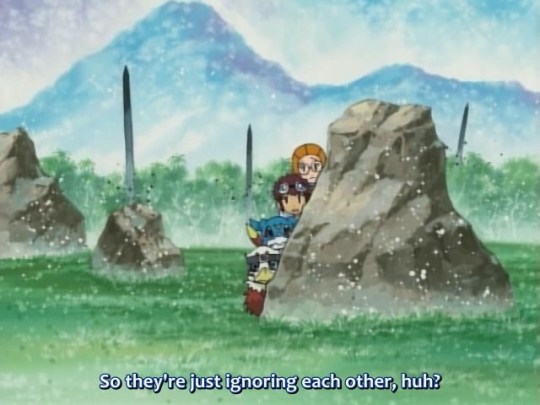
This is especially because, right after that, she recruits Daisuke into her plan to get Ken and Iori to get along -- in the end, when things really get serious, the two are incredibly like-minded (look at how in-sync they are when they scheme together).
30 is actually a surprisingly Miyako-centric episode, despite not ostensibly being one. For one, it says a lot that right now, her biggest priority is to get Ken and Iori to get along -- something that has absolutely nothing to do with herself. In episode 14, Miyako freely admitted that she had a tendency to jump to conclusions about people, and that she was shallow about aesthetics, but this is a very different Miyako from the one who harassed Daisuke for Ken’s autograph in episode 8, or immediately became distrusting of Digitamamon in episode 14. Instead, she’s simply just genuinely invested in seeing people she considers friends get along, and in a selfless manner -- one that has nothing to do with herself. She just really, really cares, a lot.
After all of the first-half hubbub of Miyako really having no idea of what to do with her emotions, the second half has her start channeling that energy into what’s always been one of her biggest strengths: checking on, connecting with, and caring about her friends. Daisuke may be an aggressive forward-thinker who can push everyone in the right direction, but unlike his predecessor Taichi, he doesn’t actually have particular charisma or leadership skills that can necessarily hold everyone together. In the absence of that ability, Miyako fills in for him, checking on the moods and feelings on everyone in the team and making sure everyone’s doing well. And that’s why she loses her temper and slaps Ken late in the episode -- because, really, she’s reached her limit on her “give him space” philosophy when he’s abusing it to be standoffish in a crisis situation, and, on top of that, she really, really did have a huge emotional investment in him.
Moving onto more Miyako in episode 31, her Jogress episode with Hikari, we get to see a little bit of the old emotionally compromised Miyako again, but -- much like the second Digimentals arc -- it involves the two of them acknowledging that both of them are not going about things the best way, and that there are things they can learn from the other.
Hikari: Miyako-san, you're a handful sometimes.
Miyako: I knew that's what you thought of me...
Hikari: But...I've always envied that.
Miyako: Huh?
Hikari: Because I can't be honest and say I'm scared or scream like you.
Miyako’s tendency to lose control emotionally results in her being insensitive much of the time, which she calls herself out on multiple times during the episode, and she can’t always be as “kind” as Hikari is -- but, on the flip side, her antics are something that can be a “light” (pun not intended) towards those who are falling in a bad mental state or into the darkness, and Hikari even acknowledges this when one of her trains of thought makes her break out into laughter. Miyako ultimately manages to get through to Hikari this way at the end of the episode, which results in a Jogress and mutual growth for both of them -- Miyako puts more thought into how to approach others (it’s pointed out at the end that she’s still thinking about understanding Ken and Hikari better), and Hikari gains more resolve and determination to fight against things instead of passively accepting her fate (she tells Takeru very directly at the end "I’m fine now. I’ll never go there again.”).
Iori and Takeru's Jogress is a little more complicated to the point where it spans multiple episodes, but a lot of it ends up having to do with the fact that the events of the BlackWarGreymon arc start really putting Iori's black-and-white principles into conflict -- it's wrong to kill something that's been proven to be alive, but it's also wrong to be evil. Putting a huge nail in that is that there's a stake in him forming a relationship with Takeru, but he doesn't really understand Takeru either -- the "two-facedness" he witnessed back in episode 19 scares even him, and he's so intimidated by Takeru that, in episode 35, he goes to approach Yamato about Takeru's past instead of asking the person directly. Takeru, hearing about this, complains that he could have just asked directly, but admits he understands why Iori did so.
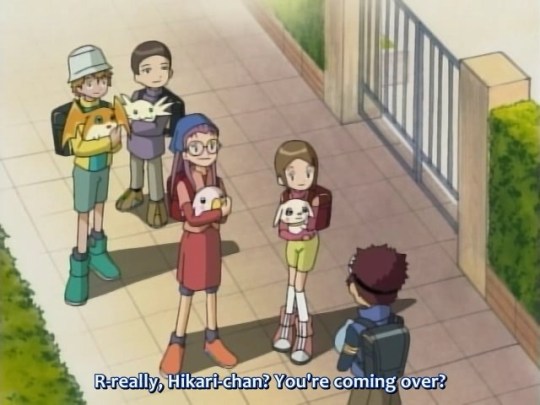
By the way, I should point out that episode 35 is the last time within the TV series that Daisuke is portrayed as having a particular interest in Hikari, and it’s just in terms of being slightly more excited that Hikari is joining his meeting. At this point, there are actual important things happening in the Digital World, and he needs to take care of Ken, too, and so...in the end, once again, Daisuke proves that he’s actually capable of putting aside those kinds of more shallow things when he really needs to.
On top of that, this is when the kids start actively working with Ken in the real world (and, if post-02 materials are any indication, continue to hang out with him even for social outings). The choice to have Ken live in Tamachi instead of Odaiba facilitated his isolation from the group during the Kaiser arc, and during around the third quarter they were all grouping up in the Digital World anyway, but the fourth quarter actually has the kids make an attempt to include Ken in their real-world outings despite the distance. Tamachi is not temporally far from Odaiba (approximately half an hour by train), but it’s a bit of a nuisance to get to, requiring crossing a bridge to/from the Tokyo mainland and paying extra for the Yurikamome. But at this point, he’s an important enough friend to them -- and them important enough friends to him -- that they’ll make it work.
At the end of episode 35, Iori finally decides -- to the point of recklessness, something that would have been previously very uncharacteristic of him -- to try and appeal directly to BlackWarGreymon to get him to stop destroying the Holy Stones so that they won’t have to fight. It’s emblematic of Iori’s heart being genuinely torn, because he’s having such a difficult time rationalizing all of these conflicting feelings. This comes to a head in episode 36, when Iori loses his temper at the rest of the group for “playing around”, but Armadimon snaps him back to reality to remind him that they’re tired and hungry, and this can’t be neglected. Iori himself ultimately becomes the one to proactively suggest that they take time to sit down and eat, indicating that -- little by little -- he’s starting to shift his thinking a bit, after being so incredibly stubborn for much of the series.
This is what leads to Iori and Takeru’s Jogress at the end of the episode, now that Iori is flexible enough in thinking to understand the emotional id behind Takeru’s mentality. And likewise, Takeru’s started to loosen up by 36, too --
Takeru: Sure, darkness is frightening, and we would feel at ease if we could get rid of it completely, but I'm sure that's impossible.
Ken: Impossible?
Takeru: Where there's light, there's always darkness.
Hikari: The brighter the light, the darker the shadow, right?
Takeru: Yes. That's why I think it's important not to lose sight of the light inside you, no matter how dark it is.
The thing about Takeru is that while he deceptively seemed more open and playful than Hikari for most of the series, he was actually bottling up a lot of emotions in a way not entirely different from the way she did. (Note how, despite how tied at the hip the two constantly are, they almost never actually talk about their thoughts on each other; it feels like a relationship where they implicitly trust each other but are practically reliant on that implicit trust to maintain that close of a friendship at all.) And he’s been keeping those emotions bottled up until they exploded in less-than-healthy ways, initially distancing himself from Iori. But being a lot more open about his thoughts on the matter allowed them to connect better, and eventually Takeru came to embrace a somewhat more reasonable stance on the matter after observing Iori.
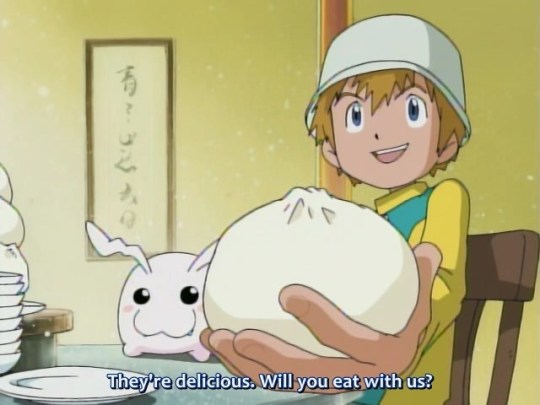
It also doesn’t seem like coincidence that this is the episode that ends with Takeru’s first major act of goodwill towards Ken.
This leads into episode 38, the Christmas episode. Fun things to note!
The episode opens with Daisuke and the other younger kids giving a “Christmas present” to their seniors in the form of letting them reunite with their partners. Remember how I said that the 02 kids always admired their seniors and looked up to them? Even this late in the series, the series does not shy away from the fact you’re supposed to see the 02 kids as their deferential juniors.
The Christmas party is, of course, notably, the first major moment of reconciliation between Iori and Ken, with Iori having gone through major harsh lessons about morality in the last few episodes, and Ken opening up more to the rest of the group. Said party is also yet another notable example of how much of a priority it is for the 02 kids to be “social life friends” and not just friends working as a Digimon incident team -- after all, having genuinely emotionally present friends is what Ken needs most in his life right now, considering that the party is treated as the first time he’s been truly happy in a long while.
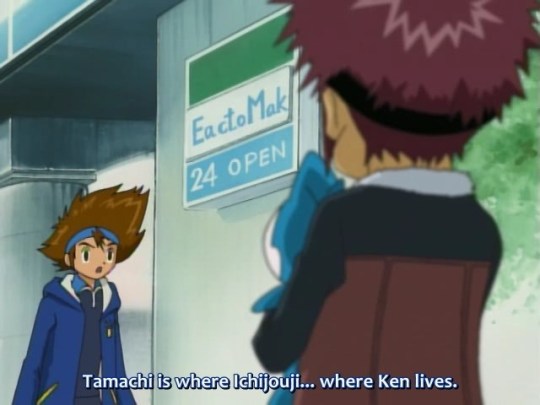
This is followed by episode 39, which is notable as the time when Daisuke finally commits to switching to given-name basis for Ken, and actually opens the episode standing against Taichi -- because he's so worried about Ken that he needs to go join him. This is something that's lost a bit in translation, but although Daisuke stands down against Taichi, he's not rude nor does he overstep his boundaries with his respected senior (he even opens his statement in polite-form Japanese) -- he's just saying, firmly and politely, "I'm sorry, but I can't go, I have to go help my friend." It’s a notable moment because while Daisuke has been becoming increasingly assertive and aware of what he really wants to do, this is the first time we’re actually seeing him refuse to defer to the very senior he’d spent so much of the series idolizing and looking up to.
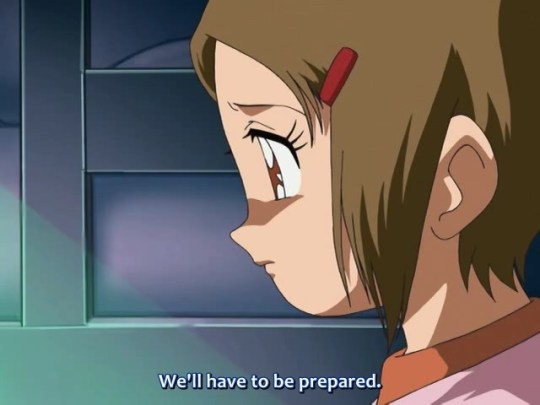
We get to episodes 43-45 (the Demon mini-arc), which is also the culmination of the 02 kids having to face the limits of pacifism. This tends to throw off people who are coming in from Adventure, since the Adventure kids ended up killing Digimon with a lot more ease in the original series, but it’s also important to make note of the fact that the episode itself deliberately portrays a gap in mentality between the Adventure and the 02 kids -- with Hikari torn between the two. It also creates an interesting subversion of expectations when Hikari, the one you’d expect to be more on the pacifist side, is the one who’s already accepted that it may be inevitable, whereas Miyako, the more aggressive and belligerent one, is the one staunchly against it.
The reason for this “paradox” comes out of a single line from Hikari in episode 44:
Hikari: You’re the one who saved him, Miyako-san.
The Adventure kids never liked killing. They were never enthusiastic about it -- it was just that they were almost immediately put in a situation where the entire fate of the multiverse was at stake thanks to some unambiguously evil Digimon who wanted nothing but wanton destruction. Even then, it was pretty clear that they never enjoyed it -- Takeru professed a desire to avoid fighting in Adventure episode 12, and the pacifist Mimi went through a breakdown in Adventure episodes 45-50 trying to avoid casualties. But one of the most important lessons Mimi learned at the time was that pacifism has its limits -- there’s no point if it ends up in more deaths than it saves, because at that point you’re adhering to moralistic principles more than you’re actually saving lives.
The fact that the Adventure kids and the 02 kids have a “different mentality” isn’t just happenstance, but outright embraced. Daisuke, Miyako, and Iori never had to actually deal with a conscious Digimon that was unambiguously evil for most of the series, and Archnemon revealing that her motives were pretty much nothing but wanton destruction in episode 29 was the first major warning signal to Iori that his pacifism might have limits. And during this Demon mini-arc, it’s not like these Digimon are threatening multiverse destruction or anything -- it really does seem like a constant “glimmer of hope” that maybe, just maybe, they can save people non-lethally. Alas, they can’t.
Daisuke, being someone who’s inherently practical-minded, starts entertaining the idea that push may come to shove as early as episode 25, and finally makes his first statement about practical limits in episode 43. But the more emotionally caught-up Miyako and Iori end up taking another episode to swallow it, and they don’t take it well. Most of the attention in 44 is given to Miyako, and it reconfirms that, despite her aggressive exterior, she’s emotionally sensitive and empathetic -- and while killing LadyDevimon is framed as truly the only thing that could have been done in that situation, Miyako is not faulted for being emotionally compromised, nor is Iori likewise when he faces a similar situation with Takeru and is forced to confront the people whose lives were at stake.
Episode 45, when Ken opens the gate to the Dark Ocean, doesn’t really have much to add on top of what’s already there, but this is basically “the point of no return” when everyone confirms their own emotional investment in Ken and understanding that he’s not just reformed, he’s genuinely struggling under the pain of what’s been happening -- and this is before they find out about the truth behind the Dark Seeds, and that Ken’s transformation into the Kaiser may have been supernaturally influenced, too.
It’s also interesting to see the different ways each kid reacts to Ken as they support him:
Hikari, the most outwardly compassionate, goes to support him the second she notices him in physical pain; Takeru notices that it might work, realizes Ken needs the support, and joins.
Iori and Miyako reflect on how Ken’s putting all of his efforts in, and lambast themselves before joining. Interestingly, given the circumstances behind what’s happened up until now, Iori and Miyako criticizing themselves take a different meaning -- Iori, who’d been scornful of Ken until recently, seems to be regretting that he distrusted him when Ken had been trying so hard, while Miyako, who had been open to him since episode 25, seems to be upset that she’s sitting there and not doing enough when he’s in all of this pain.
And Daisuke, of course, the most “forward-thinking” of them all, gives Ken a speech about what he’s done so far and reminds him that he’s already done more than enough for “atonement” -- which is, of course, what directly reaches Ken the most.
And when we get to episode 46, and the kids, now knowing about the Dark Seeds, hold a roundtable (and emotional support group) to discuss what to do about the Dark Seeds, Daisuke’s the one with the most spirit and energy about it, but...
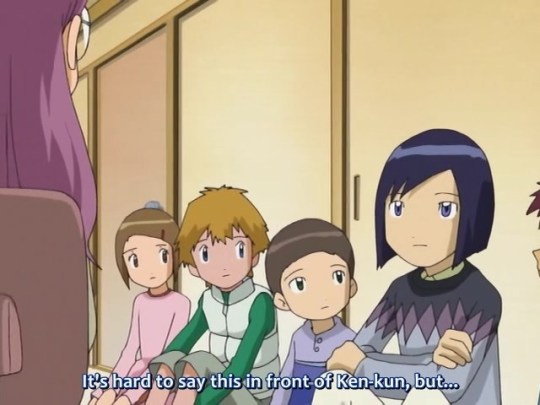
...the one actually leading the roundtable? Miyako.
Miyako: Sorry, that's all I can think of.
Ken: Please don't worry about me.
Miyako: (nods)
It’s subtle, but the scene in question does actually make a deliberate move in indicating that Miyako’s continuing to channel her emotional sensitivity and desire to go out of her way to help Ken -- of course, they all know how traumatic this is for him, but she’s the one who’s actively calling attention to how he must feel about it first and foremost.
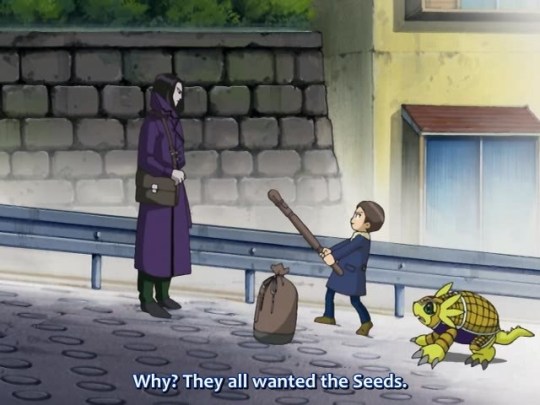
Episodes 47 and after end up becoming yet another major wake-up call for Iori (seriously, I do not understand why people claim he had no character arc when this wasn’t even remotely subtle) when he learns that Oikawa, whom he’d pinned as “evil”, has a deep relationship with the father he’d grown up idolizing so much, and it completely flips his world around -- even though he had started to get a bit more open-minded, he’s still trying to rationalize what should have been, in his mind, two diametrically opposite things. It fuels his confusion and desperate desire to understand more, not just about Oikawa, but about everything he’d thought about morality and why people turn to evil.
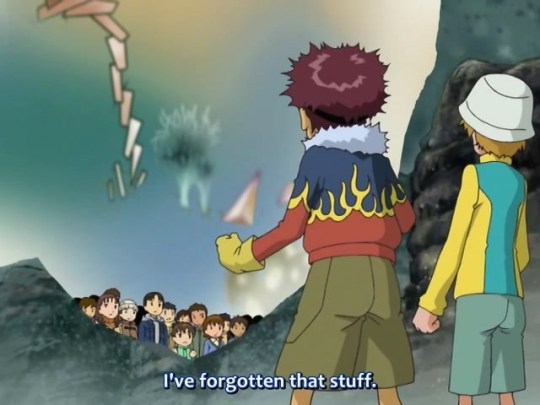
So we get to the final arc of the series, and it involves a confrontation with BelialVamdemon -- but said finale is heavily dependent on talking to the Dark Seed children and inspiring hope back into them. This results in a conversation where everyone talks about their career dreams, and Daisuke admits that he wants to be...a ramen chef, which completely blindsides even his friends.
What’s with this arc?, you might think. And moreover, why is Daisuke ending the series still kind of an idiot? Even Miyako still seems to be a bit of a mess and chaotic. Weren’t they supposed to be growing into dignified heroes, like Taichi and his friends were last series?
Well, here’s the thing -- the fact that the 02 kids end the series comparatively “undignified” is actually very inherent to the core theme of 02 itself. There were more than enough episodes that established that said kids are heroic in their own way -- caring about others, fighting on others’ behalf, and learning important lessons about what’s important to fight about. That doesn’t mean they don’t get the right to continue being disaster children while they’re at it.
Why?
Let’s look at a few official statements behind the creation and intent behind 02 as a series. From producer Seki Hiromi, from the Digimon Animation Chronicle:
That came from an idea I had while reading a newspaper article. I read a story about a nine-year-old boy going to Columbia University, and I thought, “This boy is going to college because he’s considered a genius, and everyone around him will be in their twenties, and he won’t get to have any friends his age. What kind of life would this boy end up having?”
Or some very interesting statements from head writer Yoshimura Genki from the 02 Blu-ray box:
When I was writing Ken Ichijouji, the main idea for him I used as a basis was the conflict between “the self that has to be a well-behaved child when adults are watching” and “being able to be oneself”, and the pain that came from it as a result.
So for instance, in the same way as the Pinnocchio fairytale, or the short story A.I. that was adapted into a movie, or many other works, there are probably universal worries that all children feel as they grow, but also, there were ongoing unimaginable, atrocious incidents happening with children at the time, and perhaps it was those social conditions that gave me a hint on what to do. I think I had some thoughts that I wanted to convey to the children who were living through that time.
I was given the opportunity to put those kinds of feelings, as much as I liked, into episode 23, and I am truly grateful to all of the staff, including the director.
...
Also, this is about Daisuke’s character, but I believe I paid particular attention to making him “a child who could be himself”.
He has no special talents, and although he’s clumsy and scatterbrained, I wanted him to be someone whose strength was in his straightforwardness, and wrote him that way.
Lying underneath the entirety of 02 itself is a theme about “children who are not allowed to be children”. Or, in other words, the pressure placed on children to be “talented” and “dignified” and “well-behaved”, often imposed on them by well-meaning parents who are unfortunately taking the opportunity to stroke their own ego, robbing them of the happiness and mental freedoms they should have as kids.
Ichijouji Osamu and Ken, who were placed under the pressure to be “genius children” and cracked under the pressure to please their parents. Oikawa Yukio, who was cut off from the Digital World in childhood by a well-meaning Hida Chikara, worried about his son getting into “foolish” talk. The Dark Seed children, who also fell victim to similar pressures that Ken did, and lost hope for life unless they could force themselves into that mold.
Takeru: If you want the Digimon to exist, if you believe in that, they will. Just like our feelings...Just like every child having the power to make their dreams come true.
Keiko: That's just childish.
Daisuke: You all have dreams for the future, don't you?
Noriko: Dreams for the future?
Takashi: I've forgotten that stuff.
Daisuke: No way! You must have one!
Takeru: It's nothing to be ashamed of.
Takashi: Then, what's your dream?
Daisuke: Mine? Mine's a ramen shop. I love ramen! I'll become the world's best ramen maker!
Ken: I had no idea...
Noriko: Well...actually, I wanted to be a kindergarten teacher.
Hikari: Me too.
Daisuke: What about you guys?
Takashi: A baseball player!
Keiko: I really want to be a pastry chef.
Hiroshi: When I said I wanted to be a manga artist, everyone laughed, so I gave up...
Takashi: We all had aspirations, and at some point we thought that wasn't allowed...But we were wrong, right?
Daisuke: Let people say whatever they want!
Noriko: You're right, we should be free to dream.
Miyako: Not just dreaming. If you work hard, your dreams will surely come true!
Notice something about all of these careers mentioned? They’re all the kind of “overly childish” “wild dream” “undignified” “too simple” kinds of dreams that an average parent might be uncomfortably quick to shoot down because that’s “not good enough”. These are the kids who willingly accepted the Dark Seeds; they, much like Ken, probably grew up under parents who prioritized school performance and other “societally dignified” things that ended up eating away at their happiness.
02 has a lot of different themes, but the one that lies in its undercurrent from start to finish is “so why does a child have to be this way? As long as they still understand what’s important, do they have to be dignified people? Why can’t they just be free to have dreams and be themselves?” And Daisuke and his friends are there specifically to stand up against this mentality, and to remind Ken and the other victims of it that it doesn’t have to be this way -- that it’s okay to be your true self, and be a child, and not succumb to all of those arbitrary, shallow standards people put on you. Even if that means you’re still a bit of a chaotic disaster at the tender age of eleven.
Digimon, in the Adventure and 02 universe, have always been treated like a part of the self (they were literally conceived as a physical manifestation of the soul), but in 02 they gain an extra meaning of representing “the inner, deepest part of yourself that represents your wildest ‘childish’ dreams”. The symbolism of Ken spending the first half of the series trying to reject Wormmon for being “weak” -- in other words, rejecting his own kind-hearted self for not being the kind of “strong” entity he was pressured and groomed into being -- is not lost, nor that of the Dark Seed children gaining partners when they reconnect with their dreams and wishes, nor Oikawa finally, finally meeting his partner when he comes into contact with the past he’d really lost (and especially not the fact that his attempt to reclaim shallow reminders of said childhood involved trying to make his own Digimon).
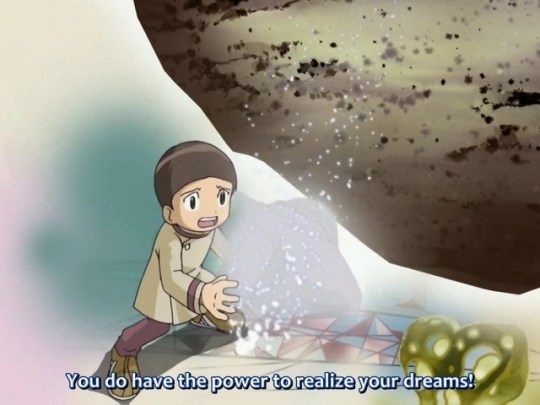
And notably, the series’s finale (prior to the epilogue) ends not on Daisuke but on Iori, escorting Oikawa to the Digital World despite how completely impossible it would have been for early-series Iori to even entertain the idea, finally coming to truly understand what happened with him and being most personally impacted by his death.
But in any case, where are we with the characters? We’re here to talk about how they’ve grown and developed over the course of the series. Let’s recap:
Daisuke: Started off the series as an abrasive kid with more bark than actual bite, constantly deferring to others and easily deflating, relying on shallow sources of validation like wanting attention from Hikari; gradually gained an ability to identify what was important and put his foot down for it, embraced his forward-thinkingness to reach out to a heavily troubled child as a friend, and ended up surrounded by a friend group that loves and respects him.
Miyako: Started off the series as a shallow, flighty girl with poor control over her emotions and difficulty in appreciating the gravity of things; came to channel her emotional range into empathy for others and compassion, bringing other people together and taking care of them.
Iori: Started off the series as a straight-laced but too principled child who stuck to “rules of what’s right” not only in morality but also in way of acting; started to appreciate the emotional nuances and heart behind why people do what they do and how it’s possible to be more flexible in “doing good”.
Ken: Well, his character arc is pretty obvious, but -- again, while his arc of learning to forgive himself is well-known, less often pointed out is that it centers very heavily on not only having penance but also not being too hung up on the past, and the futility of drowning in self-pity and regret instead of choosing to take responsibility and act more productively going forward.
Takeru: Started off the series as a seemingly mature but deceptively inscrutable character whose duality made him hard to approach; eventually opened up with the help of others and showed a capacity for being more flexible with his personal grudges.
Hikari: Started off the series emotionally repressive and passive to the point of self-destruction; eventually embraced connections with her other friends and became more active in taking a stand for herself.
Hey, not bad!
And, again, this is not a series you should be reading in terms of “self-awareness” in the same way Adventure was, but in the sense of their “relationships” and how they interact with others. By being less abrasive and more assertive, Daisuke gained the respect of his other friends. By putting her emotional capacity into caring about others, Miyako became someone who holds the group together. By learning to think a little more flexibly and be less stubborn, Iori arrived at a position where he could more easily sympathize with others in the group. Takeru and Hikari both moved from their previously relatively inscrutable positions to ones who could more effectively interact with and open up to others. And Ken, of course, became someone who managed to integrate himself into a group of true “friends” despite everything he had done against them in the first half.
This, in the end, is how you get what’s one of the tightest friend groups in Digimon history. In the end, the relationships themselves are almost like characters of their own that got development -- I say very often that you could take two of the characters and have an excellent scope of how they’d interact and play off each other by the end of the series. And although they end the series as possibly one of the most shameless, undignified disaster groups out there...they’re certainly still heroic, and in any case, given the lessons they learned throughout their own series, they probably wouldn’t have it any other way.
247 notes
·
View notes
Text
Kizuna novel ch.3-4 notes
Ch. 3:
- Back in chapter 2, when Yamato asks the 02 group to investigate Menoa, Ken mentions that he's heard of her, and he specifically says that he knows she's a prodigy who skipped grades to get into college early and has a doctorate and some patents. I didn't think of it until I realized that she's actually close in age to the Adventure kids, but the part about skipping grades reminded me of this:
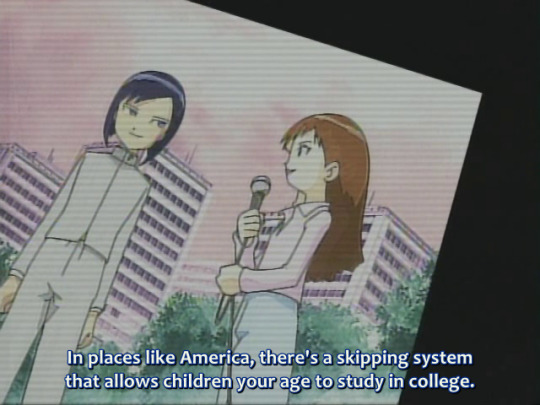
I wonder if maybe Ken first heard about Menoa because people insisted on comparing him to her back when he was the Kaiser?
- Menoa wasn't blocked from entering the Digital World, so presumably anyone with the tech to open a gate can go there, regardless of whether they have a Digimon partner or not. Which means that partner Digimon do cease to exist in both worlds when their bond disappears, because otherwise, she'd be able to reunite with Morphomon.
- I know it's supposed to be a serious scene, but it's almost comedic when Taichi and Yamato brag about having the edge in numbers and experience as Greymon and Garurumon finish off Eosmon, only for Menoa to casually snap her fingers and summon an entire swarm.
- Menoa indirectly explains the origin of Eosmon's name. She spent years trying to bring Morphomon back, but failed trying to bring the data to life. Then on the day the mysterious aurora appeared three months ago, she was suddenly able to create Eosmon, who was presumably named after the aurora. (I'm kind of surprised that the book doesn't point out that Eos and Aurora were equivalent Greek and Roman goddesses. I guess they assumed that people already know that?)
- If Menoa only made Eosmon three months ago, why has Imura been investigating her for years? It's never hinted that she did anything illegal or even unethical before that point, unless people have a problem with her trying to create a Digimon.
- Sora is the only one of the original Adventure kids missing from Menoa's neverland. Even without Koushirou's list, Menoa knows who all of them are, so I guess it must have already been too late by the time Menoa tried to send an Eosmon?
- If Menoa and Eosmon can't reunite people with Digimon partners who have already been lost (or at least illusions of them), then this scene confirms that Meicoomon did come back to life at some point.
- Menoa insists over and over that all the Chosen are there of their own free will, no mental influence involved, but the fact that they all turn silent and emotionless with glowing red eyes makes that a little bit difficult to believe.
Ch. 4:
- Eosmon start popping out of internet-connected devices all over the world and attacking Chosen. Despite Hawkmon warning that it's probably a bad idea, Miyako uses her laptop to try to find information on what's happening in the confusion, and of course, she only ends up letting another one through.
- Yamato must have given them a partial explanation at some point, since Daisuke knows enough to guess that the Digimon they're fighting are Eosmon. Likewise, Iori worries that the chaos means that something has happened to Yamato and the others, but they're too busy fighting off Eosmon to do anything to help.
- The entire 02 team seems to be calling Yamato "Yamato-senpai" now, or at least Daisuke, Ken, and Iori all do. (I don't think Miyako ever says his name, so I'm not sure about her.)
- Taichi and Yamato are hiding, uncertain of what to do. After some encouragement from Gabumon and Agumon (who says he gets the feeling that they'll be with Taichi and Yamato forever), the two of them resolve to fight. Taichi, who had been wearing his old goggles around his neck, finally puts them up on his head and says "We'll show them the bonds we have. Let's do this!"
- The kids with Menoa are back to playing with their Digimon, and still acting extremely creepy:
The children gazed at Menoa with eyes filled with adoration. Perhaps she seemed like a goddess or Madonna to them.
- Daisuke and Ken don't evolve Paildramon or Imperialdramon even though the 02 team is having a rough time fending off all the Eosmon. I guess Yamato must have warned them to avoid unnecessary evolutions, even if he didn't say why? They're much too upbeat to have been confronted with the full truth.
- This just occurred to me... The Eosmon aren't invisible, so back in chapter 1, how did one of them steal Ayaka's consciousness in the middle of a restaurant without being seen?
- After Eosmon defeats Omegamon, the other Adventure kids restrain Taichi and Yamato to keep them from running to Agumon and Gabumon (Hikari and Koushirou for Taichi, and Takeru, Mimi, and Jou for Yamato), and then their partners start attacking the two.
- As soon as they come to their senses, Hikari and the others return to their present-day appearances. Koushirou is fascinated by the evolved Eosmon, and Tentomon has to exasperatedly remind him that he really doesn't have time to stand around lost in thought.
- Menoa lost her partner when she got into college... because she wanted to be self-sufficient? It looks like they're trying to portray partner Digimon as existing solely for the kids' personal growth, and that's why they disappear when the kids are sufficiently mature? I'm not a fan of the idea. (Just to be completely clear, the the scenes of the Digimon disappearing strongly gave me this impression, but it isn’t explicitly stated anywhere. So it’s entirely possible that this isn’t what the creators intended.)
- I mean, I don’t think that the sudden and traumatic loss of one of your closest loved ones is a good metaphor for the struggles of becoming an adult.
- I'm also not fond of the way it reduces the Digimon to literal props for the kids, in-universe, even if the original anime never did a particularly good job of treating them as individuals.
- "Menoa! I'll save you!" Taichi yelled.
Yamato shouted, "Your choice wasn't a mistake!"
"But even if a choice leads to something happening..."
"We have to live in the future we chose!"
(This dialogue would work better for me if the kids had any meaningful choice in the first place. Menoa was going to lose Morphomon before long, no matter what she did.)
- "We may not be able to change fate*..."
"But we can change our destiny**!"
* 宿命 = absolute, unchangeable fate
** 運命 = destiny/fate in general
(Why are they so sure that losing their Digimon is the latter and not the former? What makes Taichi and Yamato’s refusal to accept the loss of their partners optimism, while Menoa’s is just denial?)
- Sorry if this has been a little too negative! I do like Kizuna overall, especially for the character interaction. I’m just disappointed in this particular element of the plot.
- I’ve now finished the book, and they never do explain the aurora that allowed Eosmon to come to life. I wonder if it’ll be brought up again if there’s a sequel?
- I can’t think of anything else I want to comment on right now, so just in case anyone reading this hasn’t seen it yet, I’ll link to Onkei’s summary again:
https://pastebin.com/hqVwmAaS
It’s much more comprehensive than my notes here (especially since I tried to focus on things that weren’t already covered there), so if you haven’t already, go read it!
- Also, I’ll be glad to answer any questions about the story (if I can), so if there’s anything you’re curious about, please feel free to ask!
16 notes
·
View notes
Text
sv88 spoilers
.
.
.
After days of torture watching jp twitter tweet spoilers, I finally got to read the new chapter and I’m so messed up now.
I talked about (well, sobbed about) it on twitter a lot already, but my fucking Tsukimitsu children are just the absolute best. That’s most of what this chapter is. Iori, Miyako, and Yumikage all three cast a spell together -- PERFECTION. You know they probably had to train together in order to achieve something like that. It explains why Iori called them there... and it actually explains why Miyako made such a strange face while she was on the phone with Iori. I can only imagine she knew what he planned on doing.
Speaking of which -- Miyako fighting means the world to me. She looks so beautiful in this chapter. And I want to say her power is based on healing? She seems to be attempting to heal Tooru, but I haven’t been able to read much of the dialogue yet since I’ve been crying online ever since my magazine arrived.
And for what it’s worth, Miyako’s spell at the end of her scene references the Valkyrie, which: “...In Norse mythology, a valkyrie is one of a host of female figures who choose those who may die in battle and those who may live.”
Yumikage, of course, was beautiful in battle as well. I love how emotional he gets. While Iori and Miyako both seem relatively level-headed with these matters, Yumi goes from pissed off to devastated and back again, and I just love their dynamic as a unit. While Miyako and Iori were probably training together many, many years before Yumi was even old enough to do so -- I’m sure they have a certain connection they share, and Yumikage doesn’t always agree with their reasonings.
As far as I can tell... Iori has transported Mahiru and Kuro into a pocket dimension? Or something of the sorts. I won’t pretend to know for certain, but Iori has sent them elsewhere. NOW in doing so, Iori is out for the count, though whether he’s truly dead or just unconscious, we really won’t know what to believe (because let’s face it, death is rare in Servamp and Iori hasn’t been around for long, killing him off makes little sense in a grand scheme.)
Some of you probably need to hear this, too--
Sakuya is back! And Misono, on the last page! Sakuya actually goes to the hot springs inn, I’m assuming to recruit help...? He doesn’t SEEM to be there to fight, at the least... but it’s literally the last few panels that he shows up, so we’ll see.
#oh man... this is too much for me#i have so much tsukimitsu content now#iori looked so beautiful in this chapter#even lying bloody on the ground#servamp spoilers
31 notes
·
View notes
Text
Six Love Stories | SITS {Nagito}
A/N - DESPITE the fact that my blog is basically SLBP-exclusive, my favorite Voltage game is actually Scandal in the Spotlight, hands down. (SLBP is a close second) The second season was kind of hit or miss for me, but I’ve really been digging Season 3 (even if Kota—my FAVORITE—had a plot device that is not my fav, I still enjoyed it) I’m REALLY surprised they went there with Nagi’s, but it was so perfect for him? And just, I really like SITS okay. Even if I just pretend Ryo doesn’t exist most of the time, sorry Mr Jellyfish it’s not personal, you’re totally fine just inconvenient.ANYWAY. Here is a fanfiction, written by someone who is writing about MC writing about the SITS boys. Part of my just-keep-writing-plan for NaNoWriMo.
---
She had missed this.
Having her own place, finding her own inspiration, she was firmly proud of these things, but she also couldn’t deny how easy it was, how right it felt, to sit on their couch with her legs curled under her and Little Yamato’s slightly slobbering face in half of her lap and a notebook in the other. The Greeks may have had nine muses, but hers came in a sextet.
(An accurate term on more than one level, she might have considered, as the six of them traipsed into the living room from the practice studio, in varying degrees of sweat-soaked and disheveled, but she was focused, and failed to notice.)
Little Yamato whuffed, and with the loyalty and dedication of duplicitous amnesiac, abandoned her immediately in favor of Kyohei.
It was technically October, but her mind was far way in June. A month of water. A month of weddings, of romance. It was quiet in the shared studio, save for the rain pattering against the windows of the courtyard, but she was off in a field of flowers, puffs of purple and blue hydrangeas, willowy irises, watching a laughing, rueful couple try and stay dry in the meager shelter of a an ancient, gnarled tree. It was a pretty scene, and appropriate for the story she was trying to tell but…she willed the couple to come into greater focus. “Who are they?”
“Who are who?”
She answered absently, eyes still closed, “The romantic leads, of course. I don’t know who they are, yet.”
“Ooooh, why not use me? And Kota?” Her eyes snapped open, realizing that she had not, in fact, been holding an inner dialogue, but responding to Nagito. He was only a few inches from her face, grinning mischievously before he darted over to Kota, reaching for his bandmate, who avoided his grasp with the slinky, graceful body distortion of a cat refusing a proffered petting.
He turned to glare at Nagito, only when the couch stood as a barrier between them. “Leave me outta your weird fantasies.” His scowl only deepened, including the writer this time, and she let out a nervous giggle. “Both of you.”
Nagi pouted for only a moment before sliding onto the couch next to her, throwing a friendly arm over her shoulders and squeezing them tight in solidarity. “Fine, just me then. Who am I romancing, Miss Ghostwriter?”
She hardly noticed the arm, or Ryo and Takashi floating in after the others. She was already imagining half of the couple as her tall, curly-haired friend. As he came into focus, so too did the second person. She tapped her pen against her lips, but it came in a second, clear as day. “An assistant.”
“Like you, assistant manager?” That was Kyohei, grin cocksure and crooked. Lost in the story firming up in her head, she hardly reacted.
“No, no – like, for the runway shows. An efficient perfectionist.” She could see the woman clear as day – measuring tape around her neck, not because she was a designer, but because the designers always forgot them, and she was the sort to have everything on hand, instantly, with a faint, disapproving frown for the wayward and forgetful. “Tidy as a pin, and practical, but with fabulous shoes.”
Nagi leaned in, caught up in the make believe romance for him. “Why fabulous shoes?”
How to explain? “Because that’s the contrast.” She set her pen down unconsciously, because it freed her hands to gesture. “Nagi’s…wild, and fun, and free, and she’s frighteningly efficient, you know? He’d avoid her—she’s strict, and of course she has everything scheduled and under control, locked down Nagi would think—but, there’s something glamorous about good shoes, isn’t there?”
Kota, who had not in fact left, despite his pouting, looked skeptical at best, but Nagito nodded, and she took that as an indication to go on. “So there’s something interesting there. It makes you wonder—under the tidiness there must be something at least a little fanciful, a little fun. And they give her blisters, you know? And why would someone so practical, so on top of everything, wear shoes that would give her blisters?” She waited, but only silence met her. She sighed at them. “Because they’re pretty.”
“So they get together because of shoes?” Iori didn’t sound impressed, and she wagged her finger at his failure to understand.
“They get together because it’s a good balance. She’d take care of him a little, but not spoil him. And he’d bring her the fun she won’t let herself indulge in all the way. The shoes are just a conversation piece. And of course, she’s had a crush on him forever.”
“Really?” Nagi sounded delighted.
“Really?” Takashi sounded slightly confused.
“Of course! That’s partly why she’s so strict when you work together. It’s embarrassing. And she needs to be taken seriously, she doesn’t want to be seen as frivolous – she’s ambitious about her work. And more than anything, absolutely anything, she wants your show to be perfect, and when she wants something done perfectly by golly it will be.” It was so easy to see the woman in her head, ferociously determined, fierce, proud and protective. “But Nagi wants her to smile. And he trusts her. And she trusts him, because working with him, she sees how hard he works, and she wants to help all that hard work come together.”
Kota sighed, “I feel sorry for her.”
Nagito frowned, “What, hey! Why?”
Iori nodded in agreement with Kota, while Kyohei simply chuckled. Takashi’s expression remained neutral, but she didn’t see any of them, just a field of flowers.
“And it’s not until the day of the big runway show—it’s an outdoor show, of course—“ The field of hydrangeas rearranged itself, so instead they lined a catwalk, glistening in the gloom. “—But she’s prepared for the rain, there’s a tent and the guests and the models and the clothes are perfectly dry. There’s even extra setting spray, you know, for the make-up.”
“Of course,” One of them said—Iori, perhaps?—and if there was an eyeroll accompanying it, she ignored it.
“But, she hasn’t accounted for herself, because someone has to run to the main building for last efforts, and the interns were already busy, and anyway she wouldn’t ask one of them to do it, they’d get soaked, and she gets it done but she’s caught out in the worst of it! But Nagi’s noticed—“
“Of course I would!”
“And he runs out after her. But he gets soaked too, but he’s supposed to Emcee—“
“Typical,” Kota was slouched on the back of the coach, head in his hand with every indication he was bored—except for the fact he was being obvious about it.
“So she goes to scold him—“
“Aww, man!”
“You deserved it! She worked so hard to keep everyone dry!” She was incensed on her fictional friend’s behalf, but finished, bringing her hands together in dreamy pleasure, “But before she can, you pull out a pair of rainboots, just her size.”
Nagito smiled, a sort of floaty, content smile, and she caught the gleam in his eyes and knew he knew, as he finished for her. “So her nice shoes don’t get ruined in the rain.”
She nodded.
Kyohei waved his hand to get back to the point, “Alright, shoes, show, showers, how’s it end?”
That was easy. “Happily ever after.” Iori scoffed, and she scolded him once more, “Don’t you scoff. You asked for a love story.”
“Not all love stories end happily ever after.” To her surprise, it was Nagi, with a smile that was forlorn at the edges. She leaned back and pressed her fingers to those corners, willing them to smooth with the certainty of an author’s penstroke.
“Yours will.”
Nagi turned pink, and withdrew in a dramatic show of burying his cheeks in his hands. “Aw, shucks.”
Ryo floated in from the kitchen to flutter bonelessly into a seat on the floor. “A lovely story.”
Little Yamato barked, and Kyohei leaned in. “Sure. Now who’s next?”
More of Lee’s Rambles
#sits#scandal in the spotlight#sits fanfic#Nagito Aoshima#aoshima nagito#sits nagito#nagito sits#sits drabble#scandal in the spotlight fic#sits fic#NOT SLBP WHAAAAT shock
64 notes
·
View notes
Text
the tri. plot megapost _ Chapter 1
This is the Project I’ve been working on for a while. Basically, it consists in me rewatching Chapters 1-4 and writing out every.single little plot detail that may or may not become relevant later on. It’s divided into Chapters to make it more readable. I’m doing this for Reference purposes, but I figured it may be useful for other people as well.
I may insert the ocasional note/comment, but otherwise this list will be completely objective. Feel free to add anything I may have missed.
Chapter 1 - Saikai
Prologue
In the beginning… There was the soulless creator, Demiurge… Idea, the true figure of the world… and only shapeless chaotic souls had existed in the entire universe. Demiurge does not know of the existence that created him. Nor the existence of the soul. Nor even of Idea. The world he created was merely a shadow of the true world…
A black cube travels through a strange dimension and enters a white space where white cubes flow around.
The cubes join to form a white, egg-shaped object.
As the black cube completes the egg, darkness begins to spread.
A black digi-egg, casting a white shadow, appears over a black background.
The egg begins to pulse until it hatches.
Morning, 13-17 June 2005
The news mentions about the on-going investigations about the “mass Kawasaki blackouts”, whose cause is still unknown.
Over a red background, we see Daisuke, Miyako, Iori and Ken (wearing their Digital World clothes) fall back, as their digivices fly.
Alphamon looms over the collapsed 02 kids.
In the streets, Meicoomon runs by, and a man’s phone malfunctions.
Interference appears in the Odaiba sky, and more people have trouble with their phones.
In the harbour, strange, digital cubes appear and materialise into a Kuwagamon.
Meicoomon runs by, and Hackwmon watches him.
Kuwagamon flies over Hikari, disintegrating into cubes, and enters a dark hole in the sky.
Himekawa talks to Nishiijma on the phone.
“Witnesses are starting to appear.”
“No attacks so far, but not for long.”
In Himekawa’s computer screen, we see 12 circles listing the Chosen Children’s names and coordinates.
The 02 kids’ locations are marked as UNKNOWN.
SUNDAY, 19 June
The news report “recent widespread blackouts in the Kanto region.”
News: “It’s also been suggested that there could be a connection between… the close emergence times and locations of the frequent electrical interferences.”
Meiko moves in to the building next to Taichi.
Sora’s alarm clock malfunctions, and all digits turn into 7.
Sora calls Koushirou and is confused by him speaking French; she thinks her phone is acting weird.
Koushirou: “Maybe crossed lines. The same thing’s happened before. It starts with communications in the digital realm.
Kuwagamon flies over town, his body fragmenting into cubes, as well as 1s and 0s.
Electronic devices, phones, TV screens, and traffic lights malfunction across Odaiba as Kuwagamon flies by.
The news reports about Kuwagamon (“a strange creature”) and electrical interference in Odaiba.
People panic as Kuwagamon destroys cars and buildings around Odaiba.
Taichi chases Kuwagamon, who vanishes into a portal in the sky.
Kuwagamon “materealises” on the Fuji TV building and starts chasing after Taichi.
Taichi attracts Kuwagamon to an empty field.
Taichi’s Digivice shines and Agumon appears!
Agumon’s evolution shows 0, 1, and 2.
Agumon mentions that Kuwagamon is stronger than the last time they fought.
Agumon and Kuwagamon disappear into a portal enter a strange dimension, then the Digital World, and finally appear in the Real World, at the airport.
Taichi calls Hikari, who tells him that Digimon (“unidentified creatures”) have appeared at Haneda Airport.
Nishijima picks up Taichi.
Men in suits pick up Hikari.
At Haneda airport, confusion is installed as Kuwagamon and Agumon fight.
Nishijima drives Taichi in his van, and he watches the fight on a screen.
Radio com: “The site is blocked. Call for the special unit.”
Nishijima drops Taichi at the airport.
“CODE-01, dispatched, sent under escort.”
Five of the Chosen Children (except for Mimi and Jou) show up with their Digimon partners, plus Gomamon and Palmon.
The Digimon say they don’t know how they got there.
“Before we knew it, we were here.”
Two portals open, and two more Kuwagamon appear.
Gabumon et al evolve. Three groups are formed to fight Kuwagamon.
Himekawa picks up Mimi at the airport.
Birdramon and Kabuterimon, Angemon and Tailmon defeat two of the Kuwagamons, who disintegrate into cubes that disappear into portals in the sky.
The remaining Kuwagamon attacks a fallen Garurumon. As it prepares the final attack, a portal opens behind him. A large, mysterious hand grabs Kuwagamon and drags it into the portal!
Hackmon watches as helicopters and agents surround the airport.
The kids don’t know what’s going on. They decide to get some answers from Nishijima.
Himekawa drives a van with the kids. Yamato wonders who she is.
Hackmon watches the airport scene.
MONDAY, June 20
The news reports that “unidentified creatures” caused “major damage” in Odaiba and Haneda Airport. No-one was seriously injured, flights from Haneda Airport were suspended and “transportation was seriously affected.”
News: “Action needs to be taken as quickly as possible. The same creature has appeared a few times in the past. Each time it’s caused serious damage.”
Internet comments: “What the heck they are? Are dinosaurs alive or something?”
News: “Yesterday’s outburst of several monsters all at once created even more damage, and served as a reminder of their menace and destructive power. Here’s some public reactions.”
Lady on TV: “I’m really worried that they’ll come back.”
News: “The police started inspecting the site this morning.”
Taichi says they’re treating their friends as the enemy.
Lady on TV: “The children were terrified. I hope they never come back.”
News: The government has called an emergency cabinet meeting, while the police and Self-Defense Forces are working together on a response.”
Girls at school: Tanaka-kun’s father was at Haneda, “he got injured and was hospitalized.”
Nishijima is not at school today.
Mimi starts school today, in the same class as Koushirou.
Meiko recently transferred to the school from Tottori. She is in Sora and Taichi’s class.
Overheard at school:
“What exactly were those unidentified creatures?”
“I dunno. Two monsters showed up and had a wild fight.”
“It’s for real irritating.”
“I hope they all just hurry up and die.”
Meicoomon hides in the Fuji TV building.
The Chosen Children meet under the bridge.
Koushirou: “First, let’s sort out the situation… I made a summary of six recent, strange events.
First… The gate to the Digital World has been closed off for at least a year.
(Takeru: “For some reason, Digivice was malfunctioning.”) That’s the second event.
Third… Regional radio disturbance occurred mainly around Odaiba. Right after, we had that mystery blackout.
The fourth was… Radio disturbance brought down the networks, except for wired ones. There was poor reception for cell phones, radiophones and TV broadcasts.
The fifh event. For unknown reasons, space has been distorted… which created a new, non-gate connection to Digital World. That’s how the Digimons got to this world.
The sixth event. The Digimons emerging through these distortions in space are all new to us. They went through some unknown mutation.
I suspect all events were caused by distortions in the curvature of space.
Initially, I didn’t know why the first two happened. But now I’m sure it was the same cause. It’s clear that the radio disturbance was due to the distortions in space. Most likely caused when Digital World connected to our world…” (He rambles on... but no subtitles for that part!)
Jou, on the media: “They’re whipping up attention by using scare tactics.”
Taichi says the media are partly right – Kuwagmon destroyed Odaiba and the Airport. Mimi says it would have been worse if Agumon hadn’t intervened. Yamato agrees and says it’s wrong to blame their digimon friends.
Later, the girls are eating at the restaureant, Meiko walks by…
Meanwhile, oth Taichi and Yamato go to the school to look for Nishijima, who is already there.
Nishijima’s full job description: “Incorporated Administrative Agency, National Data Processing Bureau, Information Strategy Section, Information Management Office, Grade 2 Management Officer, Daigo Nishijima.”
Nishijima says that being an agent is his main job.
“Recently, the distortions have emerged beween the Digital World and our world. Digital monsters are using those distortions to come through. So far we’ve handled them, but more powerful ones are turning up. That’s why we asked for your help.”
They call them “Infected Digimons.”
“Some powerful force has infected them. They lose control and start running wild.”
Yamato asks what is that force, Nishijima says they still don’t know.
Taichi asks if there’s a way to turn them “Back to what they were”; Nishijima: “Perhaps, but we haven’t found a way to do it yet.”
Dialogue between Nishijima, Taichi, and Yamato:
Nishijima: “Anyway for now, in order to prevent any further damage to our world. All we can do is drive them back as soon as possible.”
Yamato: “How do you know so much about them? You even know our secret.”
Nishijima: “After the Hikarigaoka and Odaiba incidents, more people know about Digimon. A walk-in, named Gennai, gave us information. It allows us to make an organized study of these digital monsters.”
Taichi: “So you know Mr Gennai?”
Nishijima: Only from his information. But he seems to know all about your group. (A shaded image of Young Gennai appears on screen.)
Taichi: “He was very helpful to us in the past.”
Nishijima If any more powerful Infected Digimons do turn up, we may need to ask for your help again. We’d appreciate it.
Conversation between an Unknown Male Character andHimekawa:
??: “Foreign countries are demanding information about the digital monsters.”
Himekawa: “We still don’t have all the facts, sir.”
??: “Can the walk-in, Gennai, give us any more details?”
H: “We’re unable to contact him.”
??: Anyway gather up whatever data you have at hand.
Daigo calls Maki: “I passed “It” on to the children.”
Meicoomon appears near the beach… a distortion flashes in the sky.
(POSSIBLY?) TUESDAY, June 21
The Chosen Children (minus Yamato and Jou) meet at Koushirou’s office.
Koushirou: “I’m helping out a firm my American friend started.”
Taichi tells everyone what Nishijima told them.
Koushirou has created a virtual cyberspace within his server where the Digimon can stay, as an “evacuation strategy for Digimons in an emergency”.
They can communicate via text or the monitor.
They can’t call them on cell phones because “phone processing speeds are too slow.”
Koushirou: “But if I use my laptop to aceess large monitors connected to the network, they can slip in and out of cyberspace.
They can call them anytime, they’ll either be on Koushirou’s office or in virtual cyberspace.
Takeru calls Yamato to tell him they’re meeting again next Saturday.
Takeru posts on the website Digisitined in the World [sic]:
”Kuwagamon appeared here in Tokyo. Better watch out.”
SATURDAY, JUNE 25
Koushirou pulled an all-nighter in order to finish Taichi’s new goggles, which allow him to see the distortions in space.
Any monitor connected to the internet works as a gate to Koushirou’s cyberspace.
Koushirou: “According to my research, the distortions seem to occur where mass data concentrates.”
The goggles allow them to see the data flow.
Koushirou explains how thy can detect distortions using the new goggles.
“Colors mark the difference in data format and strength.” (The light gets stronger when K connects to his server.)
Red spots are concentrations related to the distortions.
“It’s highly possible Infected Digimons could appear from large distorted areas.”
They decide to check for dangerous spots in the area.
They meet Meiko, who says she’s also searching for something… “kind of a cat”.
The Chosen Children have fun around Odaiba, with Meiko. Yamato joins them later.
A large distortion appears over Tokyo, and Alphamon appears.
They decide to find a high place where they can see more things – the Ferris Wheel.
Taichi spots a large distortion in the sky!
The kids run over to the spot…
VO: An abnormal climatic event is centered on Odaiba.To avoid injuries, an evacuation warning has been issued. Please leave the area in a safe orderly manner. This is an emergency. Evacuate immediately.
It starts raining.
Daigo tells Himekawa he cant get through to the children.
A portal appears in the cloudy sky. Meicoomon (disguise-free) looks up at it and runs. Meiko keeps looking for her partner.
Meicoomon hides, with a sigh of relief – and Hackmon appears nearby.
As Meicoomon watches, Alphamon comes out of the portal in the sky and materialises in front of her!
Alphamon looks at Meicoomon, who shows signs of the Infection for a second before running away. Hackmon watches them, and de-materialises into 0s and 1s.
The kids identify Alphamon.
Maki watches Alphamon appear: “Here. The precious one.”
Meiko continues to search for Meicoomon. She runs into the arena where Alphamon is and finds her partner at last.
Meiko: “It’s okay. You’re safe now.”
Alphamon attacks the two Meis!
Meicoomon turns red and then forms a protective ball of energy around the two of them.
Taichi and Yamato show up.
The Digimon attack Alphamon, who keeps targeting Meicoomon.
Alphamon defeats the Adult-level digimon pretty easily.
Yamato suggests Omegamon.
Meiko: “I’ll never let you have Meichan!”
Alphamon ignores the digimon’s attacks and keeps going after Meicoomon.
Taichi finally decides to fight.
Omegamon appears and fights Alphamon.
Omegamon starts to fail.
Alphamon disappears into a portal.
In her office, Himekawa watches photos of Meicoomon and Meiko on her screen, wiith a smile…
Nishijima watches the battle as well. “It got away.”
Meiko approaches the group. She shows them her Digivice and says that Meicoomon is her partner Digimon and she’s also a Chosen Child. She apologises for not telling them and thanks them for saving Meicoomon…
Post-credits scene
Jou watches the knews about the attack. Hturns it off in order to study…
Yamato asks Taichi if he’s decided to fight.
We see the large amount of destruction in Odaiba.
59 notes
·
View notes
Text
Otherside Picnic, Vol. 1
By Iori Miyazawa and shirakaba. Released in Japan by Hayakawa Publishing. Released in North America by J-Novel Club. Translated by Sean McCann.
This is the third in J-Novel Club’s line of “sci-fi yuri”, and it’s arguably the least sci-fi of the lot. In fact, I’d argue it’s more straight up horror with elements of folklore, though there are lots of explanations for what’s going on in scientific terms, and even a “works cited” at the end. As with the author’s previous book, Side-by-Side Dreamers, I think this book would be more for the horror fan than the yuri fan. That said, the relationship between the two leads is one of the main reasons to get the book. It’s told in first-person POV, and does a good job of sublimating its “I am attracted to this woman” vibe beneath a general “she is pretty while I am so plain” mindset. But it’s the plot that brings them together, as they’re relying on each other while exploring – and later, trapped – in another world which has very lethal dangers to both of them. The dangers are the reason I called the book horror – this book is TERRIFYING at times.
Sorawo is our main heroine and narrator. She presents herself as being your typical introvert with a normal past, which turns out to be mind-bogglingly far from reality, but we don’t find out about that till the end. She likes to explore abandoned areas, and one day found an entrance to another world. After a couple of brief minute-long explorations, she decides to investigate for real – and ends up about to drown in a marshland. She’s saved by Toriko, who appears to be Sorawo’s opposite, but again, appearances can be deceiving. She’s in this other world looking for her friend/mentor/crush, who disappeared a while back. They decide to team up and try to find her, and also learn more about this world and its monsters, which are seemingly based on Japanese urban legends… something Sorawo is very familiar with.
I will state here that there was one aspect of the book I wasn’t too fond of. The concept of the brilliant scientist/doctor/genius who looks like an elementary schoolgirl has been done to death in Japanese media, and I don’t think we needed it here. Honestly, Kozakura would have worked exactly the same without that aspect of her character, functioning as “mission control” and later brought in, much to her dismay, to the actual otherside world. It was hard not to think of her as Hakase from Nichijou. Other than that, though, this ended up being a ball to read, though I will state those who dislike horror imagery may want to give it a pass. There’s lots of images and phrasing designed to scare, and it works. Sorawo also grows greatly throughout the book, forced to examine her own personality and realize her shortcomings. Toriko doesn’t fare as well, as we get no POV of her, but the good news is that for once this is not the first and only book in the series, and there are two more to date. Which is good, as the book ends with everyone still trapped, and I’d like to see how/if they get out.
If you enjoyed Last and First Idol and Side-by-Side Dreamers, there’s no reason not to immediately get this book. For those new to the “genre”, I’d recommend it for thrills and great dialogue and imagery.
By: Sean Gaffney
0 notes
Text
@atsoraasayoma replied to your post: “The paradox of the relationship between Takeru and Hikari”
Considering how passionate the fanbase is for Takeru and Hikari as a ship this has been handled very delicately and is very forthright. All things considering I never realized they did not really know each other and got to know each other more until after they met with their jogress partners and actually started opening up more to each other. Now, I have to ask this question because I grew up with the English dub here and did not learn about the Japanese versions of these two since I was much older. I know you have not been particularly fond of Tri as it throws a wrench in the whole franchise, but considering that do you believe their relationship in Tri gives credence even more to the possibility of them getting involved in a romantic relationship? (I have read your extensive critique by the way. Very impressive.) And while I am it it seems to me they do have a large degree of familiarity with each other in zero two and their relationship keeps building in closeness throughout the series. They were merely acquaintances in zero two but a lot of times she has deferred to Takeru for help rather than the others and has great confidence in him (more so in English version anyway but still). As a diehard takari fan myself since my youth (and having no concept of the differences of ages of the characters between dub and sub at the time) I wanted to ask you all things considering the epilogue I had theorized that that since the epilogue does not show who their partners were their was a possibility that they could have actually gotten married, however I learned much later in life the director said in an interview they did not. Considering all of THAT do you think (minus the interview) they might change this if they make a kizuna sequel? Since they do lean heavily towards them being together (in my own warped sense probably yes, but I am not the only one) or if they do if they will leave it still ambiguous (It all depends on the director?)?
I’ll bullet-point my responses here:
I would like to reiterate that my reason for not including tri. in these analyses is that tri. and Adventure/02 are in such stark contradiction to each other (especially in regards to 02) that I will have to retroactively take a knife to the consistency of my own analyses just to make it work. It’s not relevant to my personal sentiments of whether I like or dislike the series; I’d have tried to make it work if I could, even if I disliked it (I have said multiple times that I don’t necessarily agree with all of the creative decisions I analyze, and I even have positive sentiments about Daisuke’s V-Tamer chapter even if it doesn’t track with his character). In this case, tri.’s portrayal of the two characters in question and what makes them “interested” in each other runs contrary to the nature of how they were portrayed in 02, so I honestly feel that I can’t say “tri. says that it’s possible for them to hook up after 02″ because that requires them to completely ditch everything we knew about their characters to make that setup even possible (and, to be a bit blunt about it, I’m frankly extremely doubtful that the higher-up staff on tri. even watched 02 to begin with or referenced anything beyond a SparkNotes-esque summary of it). I have to work with a version of the two characters who are as bad at communicating with each other as they were at the beginning of 02, a Takeru whose behavior and way of reacting to things that impact him run contrary to his portrayal in 02 and everything Iori helped him with, and a version of Hikari whose world revolves around her brother to the point she’d rather everyone die than she get to be with him (which is the exact opposite of the problem presented in 02, that she’d rather doom herself by doing nothing and not burdening others, including her brother). It also requires assuming that the two characters would be able to so cheerfully cut off everything regarding their other friends in 02, when so much of the series’s theme was about how influential the other four were in them opening up. Therefore, if I want to talk about “Hikari and Takeru in 02, and what their future would be like if they decided to take things in a romantic direction”, I honestly cannot believe it would be for the reasons presented in tri. instead of something more consistent with what we saw of them in 02, and figuring out some way to make it work would require mental loops to the degree that I’m not particularly willing to do. Therefore, I will not consider them in the same analysis. If someone else wants to do it, I invite them to, but I will not be the one to do it, because my priorities are with Adventure and 02 and everything that works alongside it.
My last rewatches of the Japanese version of 02 didn’t give me a particular impression that the two of them hold each other in that much regard over the others, to be honest. A lot of the Japanese dialogue revolves around the fact they don’t talk about their feelings or impressions about anything, to the point it’s borderline unnerving because you don’t understand what they’re thinking. That’s a plot point, because their Jogress arcs revolve around the fact that Miyako (who figured that Hikari must be secretly holding something over her) and Iori (who’s initially confused by the duality of Takeru’s “kindness” and sudden explosive outbursts) don’t actually “know” them as well as it initially seemed, and are the right Jogress partners for them because they have the sort of personalities who can break through those initial walls. Yamamoto Taisuke, Takeru’s own voice actor, commented on Takeru being a little “scary” because he’s “thinking about a lot of things” that he’s not being honest about (this presumably being something he can say because he was likely given clear directions to make sure a bit of “dishonesty” came off in his performance of Takeru). Since the English dub added a lot of dialogue in almost every direction (and, through no likely fault of their own, made a lot of assumptions they probably shouldn’t have), it’s probably a major reason for the disparity in impressions we have.
Regarding the epilogue and the infamous interview in question: Kizuna was overseen by Seki Hiromi, the original Adventure/02′s producer (not director), who was the same person who gave that fateful May V-Jump interview and was very firm about the epilogue holding. I don’t think anything she said discounted the idea of them two experimenting with a romantic relationship in the future; it just means that it didn’t end up going forward long-term. Adventure and 02 were very dedicated to modeling human behavior in ways similar to how it works in real life, even if it ran contrary to expectations in media, so the reality of the situation is that “childhood friend” relationships like these very rarely end up in long-term relationships and marriage down the line, because while a long-term partner should be someone you trust and can communicate with through good times and bad, “trust”, “comfort around each other”, “mutual emotional awareness”, and “romantic attraction” can all often be very different things. That two people can have a perfectly meaningful relationship with trust and admiration for each other that does not end up in a long-term romantic partnership is arguably more common than the converse (unless we want to imply that everyone has feelings for their closest friends?) -- real life will give you people with mutually trusting relationships who talk about all of their problems with each other, but have zero feelings for each other at all whatsoever, and then one will develop a crush on someone they barely even know because they’re “attractive”, and then start dating them and figure out the part of getting to know each other after the fact, and there’s no sin in that. I think it’s certainly foolhardy to deny that they had a relationship of good esteem, but whether that necessarily has to imply romance is the question for the ages, and is the likely cause of the divide between those who see it embedded in the whole series and those who don’t see it happening at all. So as a result, to be honest about it, I don’t get the impression that baiting the ship was the 02 staff’s intention, regardless of how it came out -- being really terrible at not realizing that the audience would read it differently is a very common theme with 02 -- and that’s why things ended the way they did (but of course, I don’t think that should stop those who ship it from coming up with their own outcomes).
I am not particularly holding out for a Kizuna sequel at all (as much as I’m apprehensive about how much they love to milk this, they themselves have been hinting that we shouldn’t be holding out for it), and if there were one, I’m also not sure they want to open the wound further after the controversies surrounding ship baiting in tri. and the fact that it’s unlikely they’ll want to depict anything that wasn’t in the current canon epilogue (and look how hesitant Kizuna was to portray anything particularly groundbreaking with the actual canon ships). I think, personally, the biggest fear I would have about a future entry dealing with the ship (well, beyond the fact that I really don’t want to see a future entry at all) would be that it might all too easily end up with an external party doing it to pander to the ship’s fanbase instead of paying proper care to retaining the integrity of their characters and character relationships; for me it’s not really about there being the ship or no ship as much as I care that it’s done in a way believable for their characters and not just for the sake of having it. It’s not that I think an external party making it would necessarily go off the rails -- I think the tri. stage play is a fantastic example of an external product executing this tastefully -- but lack of original staff involvement is now considered a “massive red flag” after tri.-related controversy, and Kizuna having Seki and Yamatoya’s presence was a hugely advertised part of it (and they still couldn’t escape controversy when Kakudou stepped off), so I think Toei is likely to be very cautious about how they go about this from now on.
7 notes
·
View notes
Text
Kokoro Connect: Hito Random
By Sadanatsu Anda and Shiromizakana. Released in Japan by Enterbrain. Released in North America by J-Novel Club. Translated by Molly Lee.
I had enjoyed the manga version of Kokoro Connect when it came out a few years back, so was delighted to hear that I’d get a chance to read the novel version that spawned it. And for the most part it does not disappoint me. Ostensibly a book about an alien being who toys with a high school club by causing them to swap bodies at random (each book, in fact, will have the title _______ Random), in reality it’s a good example of the turbulence that is life as a hormonal teenager with issues, some of which are larger than others, but all of which are the most important thing in the world for that person. It also has a very likeable cast, including a fascinatingly flawed hero (Taichi is our 3rd-person viewpoint character, so I’ll call him a hero even though the series is about the five kids as a unit) whose selflessness is called out as nothing of the sort.
The club is one of those sorts that was created mostly because everyone HAS to be in a club, and it functions more as a hangout for the main cast than anything else. Iori is happy, joking, and energetic; Inaba is serious, foul-mouthed, and seems to exist in a perpetual state of near-fury; Yui, who is a pint-sized powerhouse whose knowledge of karate can’t quite make up for a terror of men; Aoba, the big goofy guy who loves Yui but is mostly there to be “the friend everyone picks on”, and Taichi, who I’d mentioned above, another serious guy whose function so far is to be “the male lead”, something I suspect we aren’t quite done with even as the cast does call out his “martyr complex” over the course of this book.
But of course the point of the book is that each of these kids are more complex than you’d expect. I love series where the protagonist is boggled by the fact that their friend may have more than one side to them, and we get that here – in fact, Iori’s main concern is that she’s spent so long showing other sides to people that she can’t remember who she’s supposed to be. Her monologue about loss of identity is one of the highlights of the book, along with the climax of the book where the characters all have to decide, literally, who lives and who dies, and Iori shuts them right down. Meanwhile, the most interesting thing about Inaba (who is my favorite, sorry to be predictable), whose panic about her own personal issues, which are not related to a “traumatic past” like Iori and Yui, is that everyone will hate and pull away from her, is that it really IS overblown. This is quite a funny book when it tries to be, but the funniest line may be Iori’s blithe “So basically… you have anxiety?”.
I also want to give props to the translator. These kids sound like high school kids, and their dialogue does not read like it’s written by someone who grew up in a different time. It’s also not afraid to get coarse for realism – Inaba is meant to curse like a sailor to a degree, and she does. That said, the main reason to pick up Kokoro Connect is the characters, who make you root for them and want to see how they handle whatever’s coming next. I’m very happy this is being released.
By: Sean Gaffney
0 notes